High School and College Life Essay
High School and College are two different and polar opposite periods of an individual’s life. This is true for most of the student population in the world. The one similarity that both the periods share is that these are the times when the individual is on the verge of self-discovery and patenting a path for his and her future.
High school is usually awkward for most people as the first year of high school is usually filled with anxiety and kind of defines the role of the individual for the remaining years in the high school. The college first-year, however, is very jovial and fun, with immense choices and a variant future looming ahead of the individual. The orientation that takes place in the first year of college helps build long-term bonds among classmates.
Another difference between high school and college is that the teachers in college are more experienced than the ones in high school. They usually have prominent and high-ranking designations. The notes are usually not provided; instead, research is to be conducted by the students. Aside from this, in high school, the teachers are there to aid and help students, while in college, the professors are present to enable the students to help themselves.
Social life is also a factor of difference between high school and college. In high school, the parents usually maintain and control the education of the student, while in college, the individual has to balance his social and academic life. This makes them more prone to making mistakes that don’t get realized until later.
In high school, the individual usually makes a choice based on the advice of the parents and the teachers. Usually, parents play a strong role in the choices that are made for the individual. In college, however, the choices to be made are entirely the responsibility of the student. However, counselors are present who can guide the student through the option available.
High school students usually live with their parents with siblings as roommates. Many have the whole room to themselves. In colleges, the student usually shares the room with a complete stranger. This is actually beneficial to the students. The roommates can help each other through the loneliness of the first few days and also help in adapting to the new college life.
Most high school students originate from the same city or state. Their interests and culture do not vary much from one another. It is easy to approach another student for assistance or social matters. Many even believe that life does not differ from their own. Colleges house students from across the world. Their varying cultures clash; this makes them harder to understand one another. This is advantageous as it provides a necessary lesson in dealing with foreign co-workers, clients or superiors in further life.
High school students usually eat food prepared for them by their parents or guardians. They do not face the necessary decisions about health and diet. However, once students enter college, they must feed themselves. They must familiarize themselves with cooking utensils, groceries, and recipes. The only other alternative for them would be to either eat the greasy and fattening food the college cafeteria has to offer or the lavish and often expensive food served in restaurants located around the campus.
- Chicago (A-D)
- Chicago (N-B)
IvyPanda. (2023, October 31). High School and College Life. https://ivypanda.com/essays/high-school-and-college-life/
"High School and College Life." IvyPanda , 31 Oct. 2023, ivypanda.com/essays/high-school-and-college-life/.
IvyPanda . (2023) 'High School and College Life'. 31 October.
IvyPanda . 2023. "High School and College Life." October 31, 2023. https://ivypanda.com/essays/high-school-and-college-life/.
1. IvyPanda . "High School and College Life." October 31, 2023. https://ivypanda.com/essays/high-school-and-college-life/.
Bibliography
IvyPanda . "High School and College Life." October 31, 2023. https://ivypanda.com/essays/high-school-and-college-life/.
- Can Stress Be Fattening: Discussion
- Symbols in "Greasy Lake" by T. Coraghessan Boyle
- Definition of a good roommate
- Comparison: "A&P" by John Updike and "Greasy Lake" by T.C Boyle
- Patenting of Genetic Information
- The Ethics of Patenting Medicine
- Relationships in College
- Gene Patenting and Organ Donation
- Issues Affecting the Transition of First-Year Students Into University Culture About Motivation and Learning
- First-Year Students and Issues to Cope with
- Core Abilities at Lakeshore Technical College
- New Classroom Design Features Advantages
- First Aid in Educational Facilities
- Perception of Inequity in Assessment
- School Counseling Group Functions Analysis


Essay on High School Life Experience
Students are often asked to write an essay on High School Life Experience in their schools and colleges. And if you’re also looking for the same, we have created 100-word, 250-word, and 500-word essays on the topic.
Let’s take a look…
100 Words Essay on High School Life Experience
Introduction.
High school life is a significant phase in everyone’s life. It is a time of growth, learning, and friendships. It brings a lot of new experiences and challenges, shaping us into the individuals we become.
Academic Journey
High school is a crucial time in our academic journey. We study various subjects, each one opening a new world of knowledge. We learn to balance our time between studies, extracurricular activities, and social life. It’s during these years that we start to understand our interests and strengths.
Friendships and Social Life
High school is also a time for friendships. We meet different people, share experiences, and learn about diverse cultures and values. Our social life in high school helps us develop our social skills and understand the importance of teamwork and cooperation.
Challenges and Growth
High school isn’t always easy. We face challenges, both academically and personally. These challenges help us grow. We learn to deal with stress, manage our time, and make decisions. These experiences make us stronger and prepare us for the future.
In conclusion, high school life is a mix of learning, friendships, and personal growth. It’s a time that shapes our future and helps us understand who we are. It’s a journey that leaves us with unforgettable memories and valuable life lessons.
250 Words Essay on High School Life Experience
Beginning of high school.
High school life is a unique period in our lives. It’s a time when we start to grow up and learn about the world. When we first enter high school, everything is new and exciting. We meet new friends, learn new subjects, and start to feel more grown-up. It’s a time of change and discovery.
Academic Challenges
High school is often a time when we face many academic challenges. We study a wide range of subjects and sometimes the workload can be tough. We learn to manage our time and work hard to achieve good grades. It’s a time when we start to understand the importance of education in our lives.
Social Experiences
High school life is not just about studying. It’s also a time when we build social skills. We make friends, join clubs, and take part in sports and other activities. These experiences help us to learn about teamwork, leadership, and communication. They also make our high school life fun and memorable.
Preparing for the Future
High school is also a time when we start to think about our future. We begin to explore our interests and talents. We start to think about what we want to do after high school. It’s a time when we start to shape our dreams and goals.
In conclusion, high school life is a mix of academic challenges, social experiences, and future planning. It’s a time of growth and discovery that prepares us for the next stage of our lives.
500 Words Essay on High School Life Experience
High school life is a significant stage in everyone’s life. It is a time filled with growth, learning, and change. This essay will explore the unique aspects of high school life experience.
One of the main parts of high school life is academics. During these years, students learn about various subjects like Maths, Science, Social Science, and English. They also learn to manage their time between different subjects and homework. This helps them become responsible and organized.
Social Life
High school life is not just about studies. It is also about making new friends and learning about teamwork. Students participate in group projects, sports, and other activities. This helps them understand how to work in a team and how to deal with different types of people. They also learn to respect others’ viewpoints.
Extra-Curricular Activities
Extra-curricular activities play a vital role in high school life. These activities may include sports, music, art, and clubs. They help students explore their interests and develop new skills. They also provide a break from academic work and help students relax and enjoy.
Personal Growth
High school life contributes to personal growth. Students learn to make decisions on their own. They also learn to handle pressure, whether it is related to studies or personal life. This helps them become independent and confident.
High school life also comes with its share of challenges. These may include dealing with peer pressure, managing time, and coping with academic stress. These challenges teach students how to face difficulties and overcome them.
In conclusion, high school life is a mix of learning, growth, and challenges. It helps students become responsible, confident, and independent. It also prepares them for the future. So, students should make the most of their high school life experience.
The high school life experience is not just about studying. It’s about learning life skills, making friends, and growing as a person. It’s a time of change and growth, and it’s a time that will shape who you become in the future. So, cherish every moment of your high school life because it is a once in a lifetime experience.
That’s it! I hope the essay helped you.
If you’re looking for more, here are essays on other interesting topics:
- Essay on Higher Education
- Essay on Hiking With Friends
- Essay on Hiking Experience
Apart from these, you can look at all the essays by clicking here .
Happy studying!
Leave a Reply Cancel reply
Your email address will not be published. Required fields are marked *
Save my name, email, and website in this browser for the next time I comment.
High School vs. College: Contrasts and Comparisons
- October 26, 2023
- Office of Outreach and Relationships
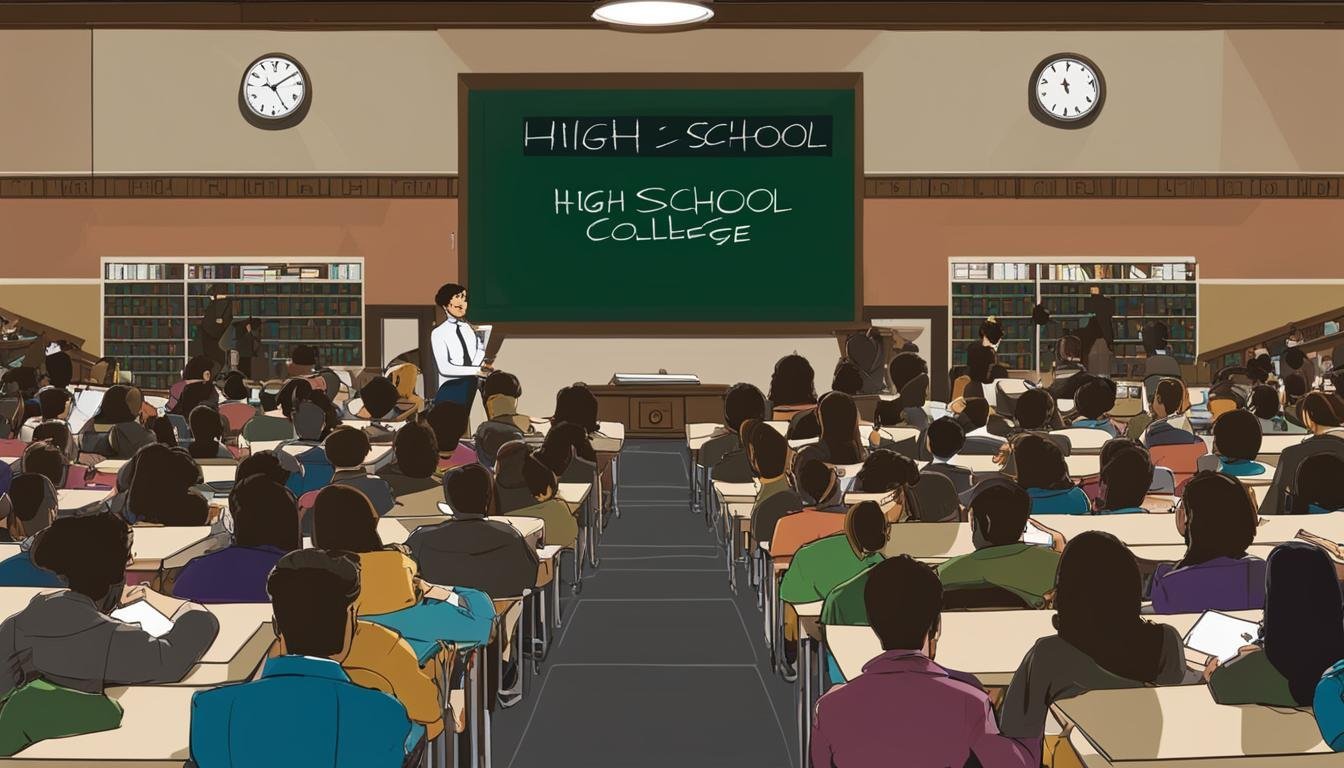
High school and college have distinct differences and similarities that shape students’ academic and social experiences. From the structure of the education system to the level of independence and responsibilities , navigating the transition from high school to college can be challenging. This article will explore the key contrasts and comparisons between high school and college life based on factual data from various sources.
General Differences between High School and College
High school and college have several fundamental differences that shape the experiences of students. One of the most significant differences is the mandatory nature of high school education compared to the voluntary nature of college education. In high school, education is mandatory and typically provided free of charge. However, college education is voluntary and often comes with a significant financial cost.
Mandatory vs. Voluntary Education
In high school, students have their time and schedules structured by others, such as teachers and parents. They follow a predetermined curriculum and have limited flexibility in choosing their classes. On the other hand, college students have greater autonomy and responsibility for managing their time and selecting their courses. They have the freedom to create their schedules based on their academic and personal goals.
Structured Time vs. Self-Management
Another key difference between high school and college is the level of structure in students’ daily lives. In high school, students have a set schedule with fixed class times and designated breaks. They are guided by teachers and parents in how to manage their time effectively. In contrast, college students have more flexibility in managing their time. They have different class schedules and breaks between classes, allowing them to allocate time for studying , extracurricular activities, and personal commitments.
Overall, the transition from high school to college involves a shift from mandatory education to voluntary education and from structured time to self-management. This transition can be challenging for students, as they navigate the newfound independence and responsibilities that come with college life.
Identifying and Disclosing a Disability: High School vs College
One of the major differences between high school and college is how disabilities are identified and disclosed. In high school, education is considered a right, and it is the responsibility of the school district to identify students with disabilities. Individualized Education Plans ( IEPs ) are developed to provide necessary supports and services to these students. However, in college, education is not a right, and students must take the initiative to self-identify to Disability Services.
In high school, the process of identifying a student’s disability is usually initiated by teachers, parents, or school counselors. The student may undergo assessments and evaluation to determine their eligibility for special education services. Once the disability is identified, an IEP is created, outlining the accommodations and support the student needs to succeed academically. These services are typically provided at no cost to the student.
On the other hand, in college, students are responsible for identifying and disclosing their disabilities to the appropriate office or department on campus, often called Disability Services or Accessibility Services. Students must provide appropriate documentation of their disability to support their request for accommodations. Unlike in high school, college does not have special education programs, and no fundamental alterations of program or curricula are required. Instead, colleges provide reasonable accommodations to ensure equal access to education.
Documentation and Support in College
When disclosing a disability in college, students need to provide documentation from a qualified professional, such as a medical doctor or licensed psychologist. This documentation should include a diagnosis, a description of the functional limitations caused by the disability, and recommendations for appropriate accommodations. It is important for students to understand that college disability offices may have specific guidelines and requirements for documentation, so it is crucial to familiarize themselves with these guidelines before seeking accommodations.
It is worth noting that while students with physical or medical disabilities may require specific accommodations, such as accessible classrooms or housing arrangements, colleges generally do not provide personal services, such as personal aides or attendants. Instead, colleges focus on providing academic accommodations, such as extended time for exams, note-taking support, or assistive technology, to ensure that students with disabilities have an equal opportunity to succeed academically.
Tests: High School vs College
When it comes to testing, high school and college have distinct differences in terms of frequency, makeup tests , and review sessions . In high school, testing is frequent and covers smaller amounts of material. Teachers often provide makeup tests for students who were absent or need a second chance. Additionally, review sessions are commonly conducted by teachers to help students revise important concepts before exams.
In contrast, testing in college is less frequent and may cover larger amounts of material. Professors typically do not offer makeup tests , making it crucial for students to be present on test days. Moreover, professors may or may not provide review sessions . When review sessions are offered, active participation and preparedness are expected from students.
These differences in testing patterns between high school and college highlight the increased level of independence and self-reliance that college students must develop. They need to manage their time efficiently and ensure they are well-prepared for exams without relying on regular makeup tests or extensive review sessions.
Grades: High School vs College
In high school, grades play a significant role in the overall evaluation of a student’s performance. Most assigned work is graded, including homework , class participation, and quizzes. Good homework grades can often compensate for lower test grades , allowing students to maintain a strong GPA. Additionally, many high school teachers offer extra credit projects as an opportunity for students to boost their grades.
However, the grading system in college is quite different. Professors typically focus their evaluation on major exams, papers, and projects, and may not assign grades for all assigned work. Test grades and major assignments have a more substantial impact on the final course grade. College students need to consistently perform well on these assessments to achieve a higher overall grade.
Furthermore, extra credit projects may not be available in college to help raise grades. Instead, students must rely on their performance on tests and major assignments. It’s crucial to start off strong in college, as initial test grades can significantly influence the final course grade. It’s also important to note that each department may have specific standards that students must meet in order to graduate.
Classes: High School vs College
One of the key differences between high school and college is the structure of classes. In high school, students typically spend an average of 30 hours per week in class, following a structured schedule. Classes are generally small, with no more than 35 students, allowing for more individualized attention from teachers. These teachers usually present material from textbooks , providing a structured and consistent learning experience.
In contrast, college class time varies, with breaks between classes and a more flexible schedule. Class sizes can range from 20 to over 100 students, depending on the course and the size of the university. Professors often present material from various academic sources, including textbooks , research articles, and multimedia resources. This diversity in teaching styles and sources of information encourages students to engage critically with the material.
Moreover, the responsibility for managing study time and completing assignments outside of class falls on the college student. Unlike in high school, where teachers often remind students of incomplete work, professors may not always check completed homework . College professors are usually open and helpful, but they expect students to take the initiative and seek assistance during scheduled office hours. Additionally, college students may have access to resources like academic skills centers or writing centers for additional support.
Homework and Assistance: High School vs College
One major difference between high school and college is the approach to homework and the level of assistance provided. In high school, teachers often check completed homework and remind students of incomplete work. They are proactive in identifying students who may need additional help and offer assistance. However, in college, professors may not always check completed homework, but they expect students to perform the same tasks on tests. It is essential for college students to take responsibility for completing their homework and thoroughly understanding the material.
In high school, teachers typically approach students if they believe assistance is needed. They provide guidance and support to help students succeed academically. In contrast, professors in college are usually open and helpful, but they expect students to take the initiative and seek assistance during their scheduled office hours. This shift in responsibility empowers college students to become independent learners and seek help when needed.
While in high school, students may have benefited from additional resources such as academic skills centers or writing centers for extra assistance, college students have access to similar resources on campus. These resources can provide guidance with writing, study skills, and subject-specific tutoring. It is important for college students to take advantage of these resources and seek the help they need to succeed academically.
Studying: High School vs College
Studying is an essential part of academic success, and the approach to studying differs between high school and college. In high school, students are typically assigned short reading assignments that are discussed in class, and studying often takes place during class time or study halls. However, in college, students are assigned substantial amounts of reading and writing that may not be directly addressed in class.
College students are expected to engage with the material outside of lectures and dedicate significant time to studying outside of class. This includes regular review of class notes and active reading of assigned textbooks and other readings . Studying in college requires self-discipline and independent learning, as students must take full responsibility for their academic progress.
While high school may provide more guidance and structure in terms of studying, college students have the opportunity to develop stronger critical thinking and research skills through self-directed studying. It is important for college students to actively seek support and resources, such as consulting with professors, teaching assistants, and tutoring services, to enhance their studying strategies and academic performance.
Class Materials: Textbooks and Readings: High School vs College
In high school, textbooks are provided at no expense to students. This means that students have access to the required reading materials without having to worry about the financial burden of purchasing textbooks. However, in college, textbooks and class materials can be quite expensive, often requiring substantial funds from students. College students are typically assigned multiple chapters of textbooks per week, along with additional research papers and readings .
One significant difference between high school and college is that reading assignments in college are often not directly addressed in class. This means that students need to engage with the material outside of lectures and take responsibility for their own learning. It requires self-discipline and the ability to manage time effectively in order to complete the required readings and understand the content.
The cost of textbooks is another factor that distinguishes high school from college. While high school students are provided textbooks free of charge, college students often have to budget for the expense of purchasing their own textbooks. This can add up to a significant cost over the course of a semester or academic year. As a result, college students may need to be strategic in their textbook purchases, considering options such as renting or buying used textbooks to save money.
Social Life in High School vs College
College offers a new social landscape compared to high school. It is a time of exploration and self-discovery, where students have the opportunity to meet new friends and form lasting connections. In high school, social interactions are often limited to classmates and a smaller circle of friends. However, in college, the possibilities for socializing are endless.
In college, students can meet new friends through various channels, such as living or studying spaces, classes, extracurricular activities, and part-time work. The social calendar in college is usually more active and diverse, offering a wide range of events and opportunities to socialize. College also brings together a more diverse student population, with individuals from different backgrounds and ages, providing a rich tapestry of perspectives and experiences.
While high school may foster close-knit relationships, college offers the chance to expand social circles and explore different interests. Students have the freedom to choose their own social groups and engage in activities that align with their passions and goals. College is a time of personal growth and development, where students can embrace their individuality and find their place in a larger community.
Independence and Responsibilities: High School vs College
One of the significant differences between high school and college is the level of independence and responsibilities that students experience. In high school, students rely on parents, teachers, and coaches to guide their time and activities. They have a structured schedule and are often reminded of their responsibilities. However, in college, students have increased freedom and must take on the responsibility of managing their own time.
College life requires students to balance their academic commitments, part-time jobs, and personal responsibilities. They have the autonomy to make decisions about their schedule, such as when to study, attend classes, and complete assignments. This newfound independence can be both liberating and challenging for students as they navigate their way through a more self-directed educational experience.
Time management becomes crucial in college. Students must learn to prioritize their tasks, set goals, and allocate their time effectively. With multiple responsibilities and deadlines, effective time management skills are essential for success. College students need to develop strategies to stay motivated, avoid procrastination, and maintain a healthy work-life balance.
Transitioning from high school to college, students often face a learning curve in managing their time and responsibilities independently. However, this shift also presents valuable opportunities for personal growth and development. By practicing effective time management and embracing their newfound freedom, college students can learn to take charge of their education and pave the way for a successful future.
Sports: high school vs college.
College sports often play a significant role in the social life and school spirit of a college. It provides a platform for students to come together, showcase their athleticism, and create a sense of community. While not all colleges have sports teams, those that do offer a wide range of opportunities for students to engage in athletics as players or enthusiastic fans.
College sports events are an exciting part of the overall college experience. They offer opportunities for students to connect with fellow classmates, bond over shared team spirit, and show their school pride. Whether it’s attending basketball games, football matches, or even lesser-known sports, the lively atmosphere and enthusiastic crowds create lasting memories and a sense of belonging.
Engaging in college sports also helps build strong bonds between students, faculty, and alumni. It fosters a sense of camaraderie and community spirit that extends beyond the playing field. Sports teams often serve as ambassadors for the college, boosting its reputation and creating a sense of unity among students and alumni alike.
What are the main differences between high school and college?
High school is mandatory and free, while college is voluntary and can be expensive. High school students have structured schedules, while college students manage their own time. High school students need parental permission for extracurricular activities, while college students decide their level of participation. High school students receive regular reminders and guidance, while college students must balance their own responsibilities.
How do high school and college handle disabilities?
In high school, school districts are responsible for identifying students’ disabilities and developing Individualized Education Plans ( IEPs ). In college, students must self-identify to Disability Services and activate approved services. IEPs from high school may not apply, and personal services for medical/physical disabilities are generally not required.
What are the differences in testing between high school and college?
In high school, testing is frequent and covers small amounts of material. Makeup tests are often available, and review sessions are conducted. In college, testing is less frequent and may cover larger amounts of material. Makeup tests are seldom an option, and professors do not rearrange test dates. Review sessions may or may not be offered.
How are grades given in high school and college?
In high school, grades are given for most assigned work, and good homework grades can raise overall grades. Extra credit projects are often available. In college, grades may not be provided for all assigned work. Grades on tests and major papers usually determine the course grade. Extra credit may not be used to raise grades.
What are the differences in classes between high school and college?
In high school, classes have a structured schedule with smaller class sizes. In college, class time varies, breaks between classes are common, and class sizes can range from 20 to 100+ students. Professors may present material from various academic sources.
How do high school and college handle homework and assistance?
In high school, teachers check completed homework and remind students of incomplete work. Teachers approach students if assistance is needed. In college, professors may not always check completed homework but expect students to perform the same tasks on tests. Professors are usually open and helpful but expect students to initiate contact during office hours.
How does studying differ between high school and college?
In high school, studying may primarily happen during class or study halls. In college, students are assigned substantial amounts of reading and writing that may not be directly addressed in class. Studying outside of class is essential, with regular review of class notes and text material.
What are the differences in class materials, such as textbooks and readings, between high school and college?
In high school, textbooks are provided at no expense to students. In college, textbooks and class materials can be expensive. College students are assigned multiple chapters of textbooks per week, along with research papers and other readings. Reading assignments in college are often not directly addressed in class .
How does the social life differ between high school and college?
High school offers close-knit relationships, while college allows students to meet new friends through various channels. College offers a more active and diverse social calendar, with the opportunity to form multiple social groups. College also brings a more diverse student population.
What is the level of independence and responsibilities in high school and college?
High school students have their time and responsibilities guided by parents, teachers, and coaches. In college, students experience increased independence and are responsible for managing their own time and responsibilities.
How does the role of sports differ between high school and college?
College sports often play a significant role in the social life and school spirit of a college. While not all colleges have sports teams, those that do create a sense of community and provide opportunities for students to engage in athletics as players or fans.
Related Posts
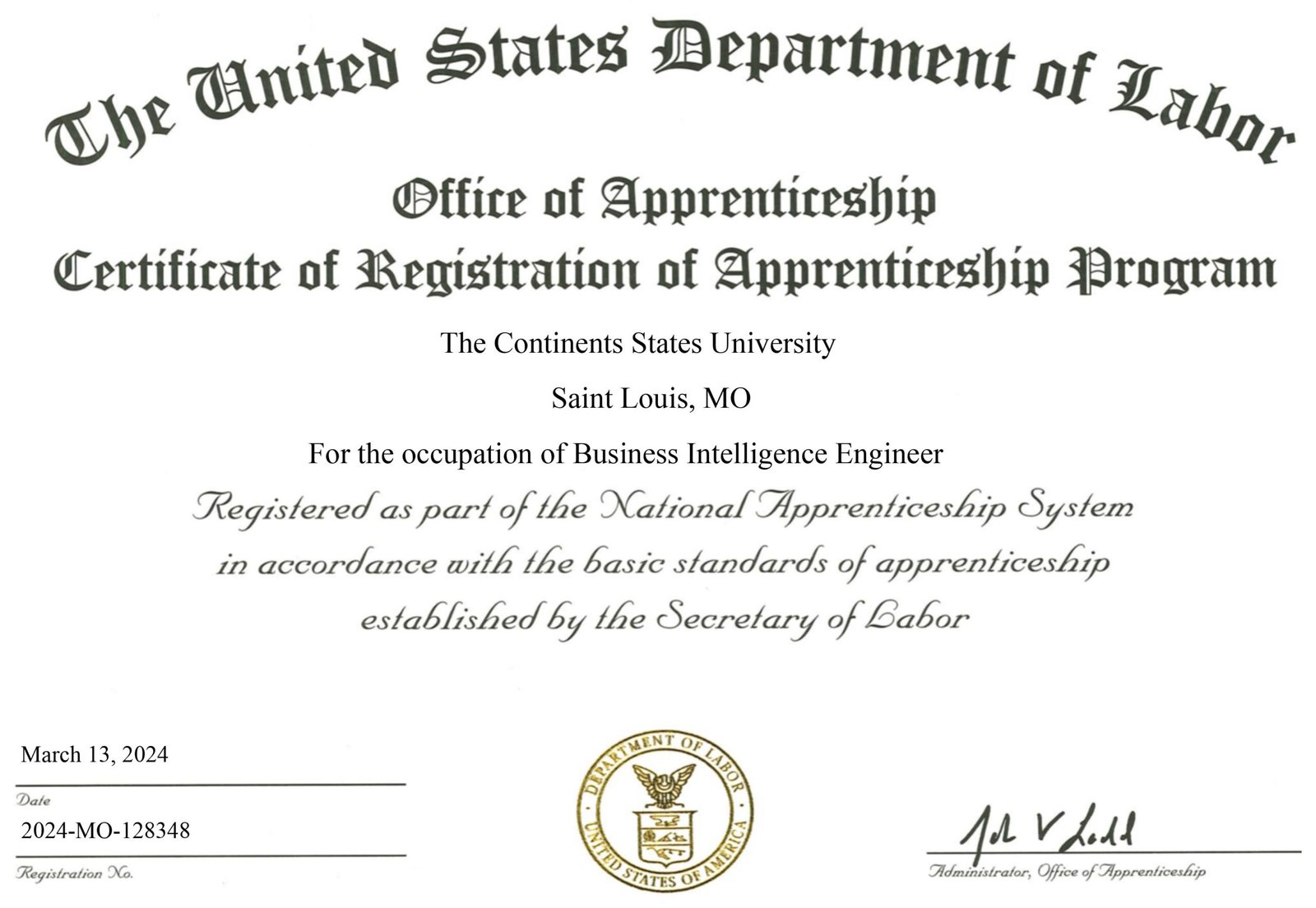
The Continents States University Receives Approval from U.S. Department of Labor for Registered Apprenticeship Program
The Continents States University Receives Approval from U.S. Department of Labor for Registered Apprenticeship Program …

Liberian Achievements: A Guide to Higher Learning
Unlock your potential with “Liberian Achievements: A Guide to Higher Learning,” exploring pathways to affordable education and career success.
College vs. High School: Differences and Similarities

Many students can’t wait for high school to end and college to start which is associated with freedom, friends, living without parents and a chance to take control over your life. Most people admit that in college they’ve entered adult life.
We won’t talk about adulthood here – as it’s not the time for tedious matters – we are going to compare the differences and similarities of life in high school and college instead. What should you expect from each? What are the main challenges of each? Is college academically hard? Let’s go straight to business.
Comparing Two Milestones of Student Life
So, you want to move out of your parents’ house as quickly as possible to have fun and attend parties, as you’ve heard these are the only things college students do. However, this is not actually true.
Obviously, there are a lot of differences between studying in high school and in college. To help you figure out what they are, we’ve prepared the lists that are divided into categories determined by different spheres and aspects of both academic levels.
Studying Process
While high school studying process might seem difficult, many students find studying in college more challenging due to lack of self-motivation.
High School:
- You attend all the scheduled classes
- You have a lot of classes a day
- You are obligated to be in school and do your homework
- You schedule your classes the way you want
- You choose classes which you long to learn
- Attending classes and completing assignments are your responsibility
- You spend most of your time on homework
- Commonly your course grade is defined by one single exam or assignment
You might be also interested to know more about the differences between high school and college finals.
Lifestyle and Social Sphere
It’s hard to be objective when it comes to comparing college vs. high school social life because getting into a college can be too overwhelming to keep a clear mind. Parties, adulthood, numerous new friends, tight budget, anxiety, new everyday routine – all of these things are like an avalanche for a freshman.
High school:
- You need to get up early in the morning to be able to get to school right on time for your first class
- You live with your parents
- You know everyone in your class
- You have a schedule assembled by your teachers and parents
- Studying at home for 2-4 hours a week might be enough – the rest of your spare time you spend as you wish
- You try to look “cool” and often feel embarrassed
- You get to know a lot of new people from different parts of the country (or the world)
- You can stay up all night – anyway, getting up the next day will be only your problem
- You can schedule your weeks as you want to
- You spend less time in class, but you have to study more in the dorm or in the library
- You can visit events and parties without someone’s permission
- Everyone is too busy to pay attention to your outfits
- Establishing a friendship with your roommate is highly recommended
Teachers and Professors
It’s not a secret that most of the time in college you spend on trying to force yourself to complete your assignment. You will also need to learn how to contact your professor and how to find his or her office hours in a gigantic schedule.
- Teachers closely follow the books
- Teachers help to be right on time with all of your assignments
- Teachers try to motivate and engage you
- Teachers provide you with assigned material
- Professors follow the books they wrote and academic works or personal experience
- No one will hunt you down for attendance, but you will have problems if you skip the classes
- You are the only one who can motivate yourself – it’s not your professor’s business
- Professors treat you like a grown-up and expect responsible and deliberate behavior from you
Food is almost the last thing a student thinks about when imagining studying in college. But it’s a very significant issue which almost in all cases requires basic cooking skills.
- Your parents provide you with healthy dishes
- You can eat in a school cafeteria during a school year
- You rarely or never cook for yourself
Just find something more nutritious than a pack of chips. These Tricks for Cooking Healthy College Meals on a Budget can help you.
So, we’ve already defined some differences between these two life stages. Let’s make an overall comparison of student life in high school and college.
College vs. High School
Life in college has so many opportunities, which were banned for students during high school years. But it is also accompanied by many difficulties students face for the first time in their lives.
High School
- You don’t know what time-management is
- You need to learn how to take care of a plant in your room
- Teachers try to encourage you to learn
- You are banned from many events
- You wish you had more spare time
- You are anxious about specialization choice
- Sometimes you lie you’re sick
- Everyone attend high-school because they are obligated to
- You think that college level is the end of learning
- You believe that tests are the worst part of studying
- You think that college students spend the whole time at the parties
- You can’t wait to get into a college
- You wish you were older
- You need to work on your time management skills
- You need to learn how to plan your budget
- You need to learn how to take care of yourself
- Self-motivation is your main task
- Parties are not as fun as one says
- Studying takes a lot of spare time
- You choose college classes which you are interested in
- You have no time to be sick
- Those who attend college do that because they want to and chose to
- You know that you have a lot more things to learn after college graduation
- You need to perform actually in-depth researches
- You think that high-school students are kids
- You can find a part-time job
- You need to learn how long human can live without sleep

Related Posts

WAIT! Do you need help with your essay?
Enter your email to get 15% off your first order.

The discount is in your inbox.
What are your chances of acceptance?
Calculate for all schools, your chance of acceptance.
Your chancing factors
Extracurriculars.
14 Differences between High School and College
Do you know how to improve your profile for college applications.
See how your profile ranks among thousands of other students using CollegeVine. Calculate your chances at your dream schools and learn what areas you need to improve right now — it only takes 3 minutes and it's 100% free.
Show me what areas I need to improve
What’s Covered:
- Academic Differences
- Social Differences
- How to Find the Best College for You
For many, college means transition. Most students who start their new lives as recent high school graduates find themselves in a bit of a limbo state. They’re technically adults, but many are still financially dependent on their parents. (And during the pandemic, they could well still be living with them every day, too.) For some, it’s the first time being away from home for a long period of time.
There’s no doubt starting college requires adjustment. You probably know that it’s not going to look the same as high school, in terms of your academics, social sphere, and many other aspects of your life. Just what will be different? Here are some of the main distinctions.
1. You have more freedom in choosing your classes (and greater variety).
You’ve probably wondered from time to time why it’s so important for you to take algebra or chemistry or world history. Here’s the good news: when you get to college, you’ll have much more leeway when it comes to choosing your courses. You’ll be able to declare a major and study a field you think you might want to pursue as a career. And you won’t have to spend much time on disciplines you dislike.
That doesn’t mean you won’t have any requirements. Many colleges have distribution requirements, meaning you’ll have to take a certain number of courses in other specified disciplines. Most majors have specific courses or general areas of courses you must take, too. And some colleges have core requirements, meaning all students are required to take specific classes as a term of their degree completion. But even the schools with the strictest requirements still tend to have far fewer than your high school curriculum.
If you really want to direct your own learning and have the fewest requirements possible, you may like open curriculum schools . These schools have no required courses, other than your major requirements and usually a writing seminar.
2. You’ll spend less time in class but likely more time studying.
Typically, a full-time college student takes about 15 credits per semester, with one credit equalling an hour of class time per week. That means you’ll only be in class for 15 hours per week, or an average of three hours per weekday. Some days, you may not have any classes at all.
That’s a far cry from high school, which you’ll usually attend for 6-7 hours per day. But don’t get too excited — you’ll also need to invest a lot more time studying and working on coursework outside of class than you did previously, given the rigor of these higher-level courses.
3. It may be surprisingly hard to wake up for that 9 am college class.
You may have found it difficult to get up in the morning in high school, but you probably had your parents telling you you had to. Plus, you had more structure in general. Even though young adults need less sleep than teenagers, according to the Sleep Foundation , the lack of rules and more freedom to make your own choices can make it difficult to get up for classes, even when they start later than your high school classes did.
It’s important to set rules for yourself about waking up on time and attending classes. This is critical for your own growth, as well as your grades. You could try to avoid early morning classes if you know you’re not a morning person, but don’t let the scheduling stop you from taking classes that interest you.
4. Classes may be longer but are usually less frequent.
In high school, your classes were probably around an hour, but you had them 4-5 times per week. In college, be prepared for long, less frequent classes. It’s not uncommon to see courses that meet once a week for three hours. Or, you might have classes that occur twice a week for an hour and a half per session (some subjects do meet more frequently and for less time, though).
You may find it difficult to sustain your attention for that long, so you should experiment with different methods to keep yourself alert. You’ll also need to put in the time to keep the content fresh during your days off from the course since you’ll have your classes less frequently.

Discover your chances at hundreds of schools
Our free chancing engine takes into account your history, background, test scores, and extracurricular activities to show you your real chances of admission—and how to improve them.
5. Attendance isn’t necessarily mandatory (but you should still go).
You probably won’t have instructors taking attendance, especially in your large lectures. This won’t necessarily always be the case though, particularly in smaller seminars; you may be given a certain number of absences before they begin to affect your grade because your presence is integral to the structure of the course.
Don’t use lack of attendance accountability as a reason not to go, however. For one, it will impact your grade, even if not directly — you’re missing out on learning the material, some of which may not be found in your textbook or LMS. You’re also wasting money, whether or not you’re paying full freight.
6. There are fewer assignments, but they matter a lot more.
Instead of frequent essays, quizzes, and tests, you may only have a handful of assignments per course during the semester. For example, in a math course, you could only have two midterms and a heavily-weighted final, while in a literature course, you might have three or four papers that comprise the majority of your grade.
Because it can be difficult to gauge an instructor’s expectations early on, and many freshmen have trouble adjusting to the new level of academic rigor, some professors will drop your lowest grade on equally-weighted assignments. This will give you a chance to make up your grade with other assignments. It’s also a good idea to visit instructors (virtually or in-person) during their office hours to get more guidance and ask questions.
7. It may be harder to get a 4.0.
You may have been #1 in your high school class, but when you get to college, you’ll be learning alongside hundreds or thousands of other excellent students, many of who also earned 4.0s. This will serve as a rude awakening for some, who are used to being the best in the class. And, because there’s no extra credit for advanced classes, you could dip below a 4.0 for earning a couple of A-’s and B+’s. That’s okay! It’s extraordinarily difficult to earn a 4.0 in college, especially if you’re attending a highly rigorous one.
8. It’s even more important to build relationships with instructors.
Developing strong relationships with teachers was important in high school for several reasons, including the fact that they’re the ones to write your college recommendation letters . In college, it’s even more critical to get to know your instructors.
For one, if you apply to graduate school or for fellowships, you’ll need faculty recommendations. Even you don’t, faculty can serve as lifelong mentors to previous students. And research shows that having an encouraging mentor increases your chances of engagement and success in work and life.
9. You will need to seek help on your own.
In high school, you may have had teachers reach out to you when you were struggling. But in college, you’ll need to be proactive about reaching out for help on your own. Sure, some professors might notice that you’re having trouble, especially in small classes, but usually, you’ll need to be the one to make the effort, whether that means going to office hours, emailing a question, or setting up a separate time to talk.
The good news is that many instructors will readily help you when you ask. They may even look more favorably upon you for being proactive and acknowledging that you need support. This is also a good way to share reasons why you’re having trouble, such as extra pandemic-related responsibilities at home. Your professor could be more willing to cut you some slack once they understand.
Social Life
1. you’ll have greater independence living away from home..
True, some students commute. But if you live on-campus, you’ll enjoy plenty of newfound independence, from what you eat to when you go to bed.
Be careful, though. You’ll likely find that you’ll need some kind of structure in your life, and it will have to be self-imposed — no one else is setting limits for you. An alarm is your friend. So is a schedule. Plus, you’ll also be responsible for doing more chores, such as laundry and cleaning.
2. There will be frequent events.
From speakers to club meetings and events to parties to concerts, there will be plenty to do on campus. While you may not have had to scramble to find ways to spend your time in high school, in many cases, there will be far more options in college.
3. You won’t have to travel far to see your friends.
Some of them might live in your dorm — or even be your roommates! Even those who don’t live in your building will be closeby, and you’ll share meals, activities, and more with them.
4. You’ll have more options for clubs and organizations to join.
Many colleges and organizations have clubs and organizations for practically any interest: arts, sports, religion, politics, activism, journalism, cultural heritage, and much more. And if you can’t find the club you’re looking for, you may even have the option of starting it yourself.
5. You’ll need to remind yourself to take time to enjoy yourself sometimes.
College is hard. With all the work you have to do, it can be easy to get caught up in studying. Of course, you should study — but don’t forget to enjoy yourself, too. College goes by quickly, and you don’t want to miss out on a great experience.
How to Find the Best-Fit College
Adjusting to college takes time and effort, but it helps if you find the right fit school for you. This depends on numerous factors, such as size, location, and the availability of your unique program.
Once you find the perfect fit, how do you know if you have a good chance of getting in? CollegeVine’s free chancing engine will estimate your real odds of admission to hundreds of colleges and universities all over the country — and offer tips to improve your profile. Give it a try to streamline your college strategy!

Related CollegeVine Blog Posts

College Life Essay for Students and Children
500 words essay on college life.
College life is known as one of the most memorable years of one’s life. It is entirely different from school life. College life exposes us to new experiences and things that we were not familiar with earlier. For some people, college life means enjoying life to the fullest and partying hard. While for others, it is time to get serious about their career and study thoroughly for a brighter future.

Nonetheless, college life remains a memorable time for all of us. Not everyone is lucky enough to experience college life. People do not get the chance to go to college due to various reasons. Sometimes they do not have a strong financial background to do so while other times they have other responsibilities to fulfill. The ones who have had a college life always wish to turn back time to live it all once again.
The Transition from School Life to College Life
College life is a big transition from school life. We go through a lot of changes when we enter college. Our schools were a safe place where we had grown up and spent half our lives. The transition to college is so sudden that you’re no longer protected by your teachers and friends of your school time.
College life poses a lot of challenges in front of you. You are now in a place full of unfamiliar faces where you need to mingle in. It teaches us to socialize and form opinions of our own. In college, students learn their free will and they go on to become more confident and composed.
In school life, we were always dependant on our friends or teachers. College life teaches us to be independent. It makes us stronger and teaches us to fight our own battles. It also makes us serious about our careers. We make decisions that will affect our future all by ourselves, as in school life our parents did it for us.
Additionally, in schools, we viewed our teachers as our mentors and sometimes even parents. We respected them and kept a distance. However, in college life, the teacher-student relationship becomes a bit informal. They become more or less like our friends and we share our troubles and happiness with them as we did with our friends.
Get the huge list of more than 500 Essay Topics and Ideas
College Life Experience
College life experience is truly one of a kind. The most common memories people have of college life are definitely goofing around with friends. They remember how the group of friends walked around the college in style and playing silly pranks on each other.
Moreover, people always look back at the times spent in the college canteen. It was considered the hub of every student where they enjoyed eating and chatting away with their friends.
Another college life experience I have seen people cherish the most is the annual fest. The annual fest created so much excitement and buzz amongst the students. Everyone welcomed other colleges with open arms and also made friends there. All the competitions were carried out in a good spirit and the students dressed their best to represent their college well.
FAQs on College Life
Q.1 How is college life different from school life?
A.1 College life is completely different from school life. It gives us more exposure and also makes us more confident. Our teachers act more like friends in college, whereas in school they’re like our mentors. Most importantly, college life gives us various challenges than our school life.
Q.2 What are some memories of college life?
A.2 Those who have experienced college life have some common memories. People always remember their free time which they spent with friends goofing around. Everyone remembers the annual fest of the college which brought so much excitement and buzz in student’s lives. Furthermore, they remember the college canteen which always fed their empty stomachs.
Customize your course in 30 seconds
Which class are you in.

- Travelling Essay
- Picnic Essay
- Our Country Essay
- My Parents Essay
- Essay on Favourite Personality
- Essay on Memorable Day of My Life
- Essay on Knowledge is Power
- Essay on Gurpurab
- Essay on My Favourite Season
- Essay on Types of Sports
Leave a Reply Cancel reply
Your email address will not be published. Required fields are marked *
Download the App


Challenges in College , Getting Into College
High School vs College Life: Fun Must-Know Differences

There are some very big differences between high school and college life. Both are fun in their own ways and both have unique experiences to offer you. But there is no denying that there are some fun and important differences between the two in terms of social life, academics, and sports. Finally, one of the biggest differences is how much more you are in control of everything. We’ll go over all of these differences here, and get you the lowdown on high school vs college life.
How Different Are College and High School?
In short, they are extremely different. In college, you can create your own future and your own identity. You get an entirely new social group and newfound independence. You are in full control of who you become.
College is unlike high school, where your identity and reputation has remained the same for a while. You choose your classes and can study anything and you are treated as an adult in those classes. So say goodbye to cliques, set schedules, and mandatory classes, and say hello to choice and independence.
Welcome to college!
High School vs College: Academics
From homework to class time to exams to teacher-student relationships, high school vs college life has its differences.
1. Time Spent in Class and Attendance
Your professor likely won’t be taking attendance, and even if they are, it’s up to you if you want those participation points or not. Your involvement in the class is also voluntary. Your teacher will not call on you like they did in high school, and it’s up to you if you want to do the bare minimum on projects and assignments or really take the time to learn and grow in a subject. Your relationship with professors is also up to you. You can choose to get to know them for networking, or choose to be an (almost) anonymous student in the crowd.

Photo by Pixabay from Pexels
2. the workload.
Truthfully, college courses and materials will be more challenging than in high school. But that does not mean it is more challenging to succeed. Some even say college is easier than high school! Exams can be long, writing assignments are frequent, and there are more debates and discussions. Just study hard and be sure of what the teacher is assigning and you’ll be fine.
3. Grades and Graduation
It is your sole responsibility to ensure that you are getting the grades you want. There will be no one to remind you of deadlines, or to push you harder. If you want a bit of a push, try to join a study group in your major or classes but ultimately, it’s still your choice whether to succeed or not in college. Graduating on time is also under your control. You need to make sure that you are both taking and passing the classes you need to graduate from your program on time.
4. Textbooks and the Readings
In high school, textbooks are given to you, but in college they are very expensive. However, you will definitely get your money’s worth, because college is all about textbook reading. Expect to be assigned several chapters of a textbook per week, in addition to research papers, opinion pieces, and other types of books.
5. Class Size, Style and Variety
During college, you will be challenged, but in a good way. You will feel that your mind is being opened in a way that you enjoy, as there is much less rote work in college. In addition, you will finally be studying exactly what you want to study. In the first few years you may find yourself in larger classes, but they will get smaller as courses become more specialized.
At University of the People , as well as with many other flexible, online schools, the most fun part of college academic is the freedom you have to complete classes. You can arrange your flexible coursework for whenever works for your schedule. So whether you are a parent that is struggling to have a healthy work-life balance while you study, or just someone who wants to enjoy the best of all worlds during school- UoPeople is a great choice for you!
High School vs. College: Your Life Won’t Look the Same

Photo by Giftpundits.com from Pexels
One of the most fun but also scariest differences in high school vs college life is that you are in the driver’s seat. You are in complete control of your time, your schedule, and your study habits. This can be a fun change because you are finally free to study and organize your day in a way that is best and most productive for you. On the flip side, this can backfire if you don’t organize your time well , or don’t implement enough self discipline.
1. Dorm Life and Roommates
Whether you are living on campus, off campus, or in the Greek community, chances are you will be cohabiting your room or living space with others in college. This is a great opportunity to learn to live with others, make the best friends of your life, and have an amazing support system. If you didn’t choose your roommates or housemates (or even if you did), keep an open mind and establish rules in the beginning.
2. Healthy Lifestyle and What to Eat
Worried about the freshman 15? While it can be tempting to eat whatever you want during college, and hard to stay on top of your health due to a busy schedule, staying healthy and fit is possible. Take advantage of your school gym or intramural leagues, and make the decision to eat healthy by making good food choices and avoiding too many tempting delivery and dessert options.
3. Time Management
In high school, your family members, teachers, and coaches had much more say in your schedule. Now you are on your own and need to learn how to manage your time. Create a weekly calendar for yourself with due dates and events, and make sure to review and update the calendar often.
4. Adulting: Responsibility and Independence
You are now an adult living on your own. That means increased independence and increased risks. It’s up to you to make responsible choices about drinking, drugs, intimacy, academics, and time management. There will be temptations in college to stray from your main purpose of getting an education. Create a strong social support for yourself to help you in college, and start each year with the right intentions.
You will also be forced to be either more or completely financially independent. Try to set up a budget as soon as possible that fits with your income and your lifestyle. Speak with your financial aid advisor at the beginning of college and whenever possible throughout to make sure you are doing what you can to either reduce tuition or quality for financial aid. You might need to find part-time work to make ends meet while you are in school as well.
High School vs College: Social Life
New school, new friends, new you! College is a whole new way to meet people and to make new, lasting friendships.

Photo by Helena Lopes from Pexels
1. new friends = diverse social life.
In college, you will gain so many new friends — from your new living or studying spaces, from classes, extracurricular activities, and part-time work. This leads to a much richer social life than the one you may have had during high school. Your social calendar will be much more varied as well. With new things added such as club meetings, new volunteer opportunities, study groups and greek or dorm events if you choose to live on campus.
2. More Social Opportunities
Your more jam-packed calendar will lead you to meet countless people, and those people will introduce you to more people! You will have endless opportunities to meet others and will constantly be forming new friendships until you find the ones that stick.
3. More Student Diversity
College is full of students of more varied backgrounds than the classmates you spent your high school years with. In high school, you are all from the same area and are all of the same age. In college, you will meet people who came from all over the country, as well as international students from across the globe. There will be students much older than you, as well as people with differing opinions and backgrounds than your own.
4. Multiple Social Groups
Due to your varied social experiences in college, you will end up with multiple social groups — one of the reasons your calendar is so full! Make the best of all these new social experiences while you can and don’t be overwhelmed. You will soon get into your groove and find the groups that you really click with and topics you are truly passionate about that will stay in your life past college.
5. Student-Teacher Relationship: Being Treated as an Adult
At very large universities, you will no longer be able to see your teacher as your friend, or someone who knows you personally. In high school, you see your teachers in small groups every day, and for years throughout the school grounds. A personal relationship usually develops. That is not often the case in college — but use this to your advantage! The fact that not everyone has a personal relationship with professors makes it that much more unique and beneficial to you if you do. Get to know your professors from the start, and what research they are doing or what projects they have been a part of and see if you can get involved somehow. Never too early to start networking!
6. Try to Stand Out to Make New Friends
First of all, it will be harder to stand out in college, simply because there are so many more people there than in high school, and everyone has a wide range of interests and talents. But that doesn’t mean you shouldn’t try. Put yourself out there, share who you are, and stand out in your own way and you’ll be rewarded with friends who share your interests and values.
High School vs College: Sports
Whether you are a player or a fan, there are some fun differences in college sports.
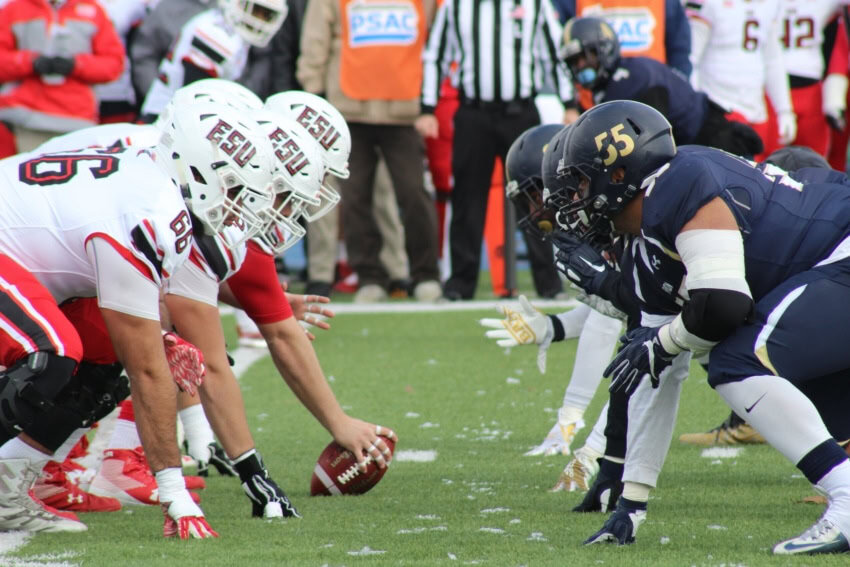
Photo by football wife from Pexels
1. school spirit.
This one will of course depend on the high school and the college you attend. Some colleges don’t have sports teams, but if yours does, be ready for some fun! College sports becomes a big part of social life and the school spirit experienced in college is unavoidably contagious. Even if you are not a sports fan, you might get wrapped up in cheering for your school, or feeling pride with a big win. In addition, college sports are something that people of all ages attend, so you might continue your fandom and game attendance for years after you graduate college.
2. Being a Player
If you already play in high school and are looking to play college sports, make sure you know what you are getting into. Being on a college sports team is much more similar to a part-time job than an extracurricular in terms of commitment, effort and time. Playing in college is a big deal and a serious decision. Being on a sports team in college can also lead to bigger things such as being drafted for a national team, or coaching.
Prepare Yourself for Transition
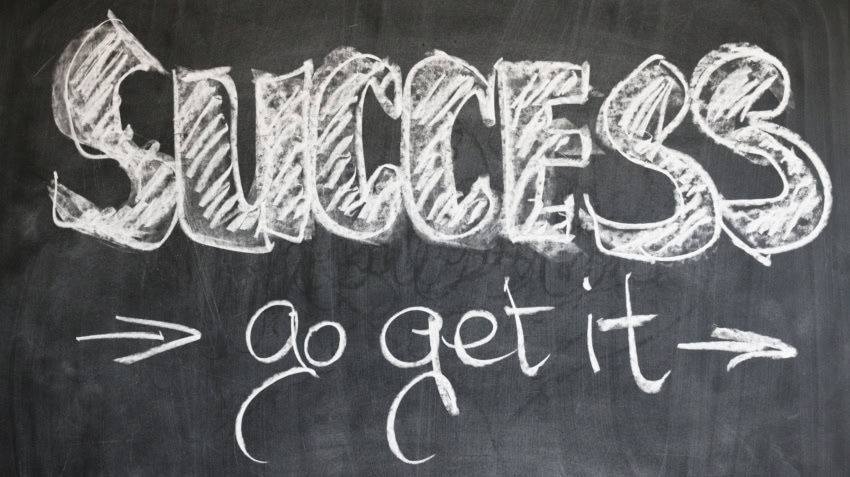
Photo by Gerd Altmann from Pexels
1. does high school prepare students for college.
Unfortunately, most people say that no, high school doesn’t prepare you for college academically or socially. You may be in for quite a surprise your first quarter of college, but remember you’re not alone — many freshmen students have a rocky start to college. If you took AP or IB classes in high school, you may be better equipped for college because you know what to expect academically.
2. Is College Easier Than High School?
College can be easier than high school in certain ways. While yes, it is more academically challenging, there are several things that make college easier than high school. First of all, you are taking less classes and therefore have less due dates and class material to keep track of. You also get a clearly detailed syllabus with class schedule, timeline, grade explanations, and student expectations in the first week, so you know exactly how the semester will go. You can plan ahead and be prepared for every class. Finally, college is easier because you are studying topics that interest you and you are naturally more motivated to study those topics of interest.
3. Is College Better Than High School?
Absolutely — college is the best time of many people’s lives. You are independent for the first time, you get to choose your classes, your social life, and your schedule. This is all very different from high school, where most things are chosen for you, and you have been with the same people and had the same reputation for some time.
In conclusion, high school vs college life does have many differences, but most of them are positive differences. After you graduate high school , you are ready for anything if you put your mind to it!
Check out our fun flip card game!
Related Articles

Choose Your Test
Sat / act prep online guides and tips, 177 college essay examples for 11 schools + expert analysis.
College Admissions , College Essays

The personal statement might just be the hardest part of your college application. Mostly this is because it has the least guidance and is the most open-ended. One way to understand what colleges are looking for when they ask you to write an essay is to check out the essays of students who already got in—college essays that actually worked. After all, they must be among the most successful of this weird literary genre.
In this article, I'll go through general guidelines for what makes great college essays great. I've also compiled an enormous list of 100+ actual sample college essays from 11 different schools. Finally, I'll break down two of these published college essay examples and explain why and how they work. With links to 177 full essays and essay excerpts , this article is a great resource for learning how to craft your own personal college admissions essay!
What Excellent College Essays Have in Common
Even though in many ways these sample college essays are very different from one other, they do share some traits you should try to emulate as you write your own essay.
Visible Signs of Planning
Building out from a narrow, concrete focus. You'll see a similar structure in many of the essays. The author starts with a very detailed story of an event or description of a person or place. After this sense-heavy imagery, the essay expands out to make a broader point about the author, and connects this very memorable experience to the author's present situation, state of mind, newfound understanding, or maturity level.
Knowing how to tell a story. Some of the experiences in these essays are one-of-a-kind. But most deal with the stuff of everyday life. What sets them apart is the way the author approaches the topic: analyzing it for drama and humor, for its moving qualities, for what it says about the author's world, and for how it connects to the author's emotional life.

Stellar Execution
A killer first sentence. You've heard it before, and you'll hear it again: you have to suck the reader in, and the best place to do that is the first sentence. Great first sentences are punchy. They are like cliffhangers, setting up an exciting scene or an unusual situation with an unclear conclusion, in order to make the reader want to know more. Don't take my word for it—check out these 22 first sentences from Stanford applicants and tell me you don't want to read the rest of those essays to find out what happens!
A lively, individual voice. Writing is for readers. In this case, your reader is an admissions officer who has read thousands of essays before yours and will read thousands after. Your goal? Don't bore your reader. Use interesting descriptions, stay away from clichés, include your own offbeat observations—anything that makes this essay sounds like you and not like anyone else.

Technical correctness. No spelling mistakes, no grammar weirdness, no syntax issues, no punctuation snafus—each of these sample college essays has been formatted and proofread perfectly. If this kind of exactness is not your strong suit, you're in luck! All colleges advise applicants to have their essays looked over several times by parents, teachers, mentors, and anyone else who can spot a comma splice. Your essay must be your own work, but there is absolutely nothing wrong with getting help polishing it.
And if you need more guidance, connect with PrepScholar's expert admissions consultants . These expert writers know exactly what college admissions committees look for in an admissions essay and chan help you craft an essay that boosts your chances of getting into your dream school.
Check out PrepScholar's Essay Editing and Coaching progra m for more details!

Want to write the perfect college application essay? Get professional help from PrepScholar.
Your dedicated PrepScholar Admissions counselor will craft your perfect college essay, from the ground up. We'll learn your background and interests, brainstorm essay topics, and walk you through the essay drafting process, step-by-step. At the end, you'll have a unique essay that you'll proudly submit to your top choice colleges.
Don't leave your college application to chance. Find out more about PrepScholar Admissions now :

Links to Full College Essay Examples
Some colleges publish a selection of their favorite accepted college essays that worked, and I've put together a selection of over 100 of these.
Common App Essay Samples
Please note that some of these college essay examples may be responding to prompts that are no longer in use. The current Common App prompts are as follows:
1. Some students have a background, identity, interest, or talent that is so meaningful they believe their application would be incomplete without it. If this sounds like you, then please share your story. 2. The lessons we take from obstacles we encounter can be fundamental to later success. Recount a time when you faced a challenge, setback, or failure. How did it affect you, and what did you learn from the experience? 3. Reflect on a time when you questioned or challenged a belief or idea. What prompted your thinking? What was the outcome? 4. Reflect on something that someone has done for you that has made you happy or thankful in a surprising way. How has this gratitude affected or motivated you? 5. Discuss an accomplishment, event, or realization that sparked a period of personal growth and a new understanding of yourself or others. 6. Describe a topic, idea, or concept you find so engaging that it makes you lose all track of time. Why does it captivate you? What or who do you turn to when you want to learn more?
7. Share an essay on any topic of your choice. It can be one you've already written, one that responds to a different prompt, or one of your own design.
Now, let's get to the good stuff: the list of 177 college essay examples responding to current and past Common App essay prompts.
Connecticut college.
- 12 Common Application essays from the classes of 2022-2025
Hamilton College
- 7 Common Application essays from the class of 2026
- 7 Common Application essays from the class of 2022
- 7 Common Application essays from the class of 2018
- 8 Common Application essays from the class of 2012
- 8 Common Application essays from the class of 2007
Johns Hopkins
These essays are answers to past prompts from either the Common Application or the Coalition Application (which Johns Hopkins used to accept).
- 1 Common Application or Coalition Application essay from the class of 2026
- 6 Common Application or Coalition Application essays from the class of 2025
- 6 Common Application or Universal Application essays from the class of 2024
- 6 Common Application or Universal Application essays from the class of 2023
- 7 Common Application of Universal Application essays from the class of 2022
- 5 Common Application or Universal Application essays from the class of 2021
- 7 Common Application or Universal Application essays from the class of 2020
Essay Examples Published by Other Websites
- 2 Common Application essays ( 1st essay , 2nd essay ) from applicants admitted to Columbia
Other Sample College Essays
Here is a collection of essays that are college-specific.
Babson College
- 4 essays (and 1 video response) on "Why Babson" from the class of 2020
Emory University
- 5 essay examples ( 1 , 2 , 3 , 4 , 5 ) from the class of 2020 along with analysis from Emory admissions staff on why the essays were exceptional
- 5 more recent essay examples ( 1 , 2 , 3 , 4 , 5 ) along with analysis from Emory admissions staff on what made these essays stand out
University of Georgia
- 1 “strong essay” sample from 2019
- 1 “strong essay” sample from 2018
- 10 Harvard essays from 2023
- 10 Harvard essays from 2022
- 10 Harvard essays from 2021
- 10 Harvard essays from 2020
- 10 Harvard essays from 2019
- 10 Harvard essays from 2018
- 6 essays from admitted MIT students
Smith College
- 6 "best gift" essays from the class of 2018

Books of College Essays
If you're looking for even more sample college essays, consider purchasing a college essay book. The best of these include dozens of essays that worked and feedback from real admissions officers.
College Essays That Made a Difference —This detailed guide from Princeton Review includes not only successful essays, but also interviews with admissions officers and full student profiles.
50 Successful Harvard Application Essays by the Staff of the Harvard Crimson—A must for anyone aspiring to Harvard .
50 Successful Ivy League Application Essays and 50 Successful Stanford Application Essays by Gen and Kelly Tanabe—For essays from other top schools, check out this venerated series, which is regularly updated with new essays.
Heavenly Essays by Janine W. Robinson—This collection from the popular blogger behind Essay Hell includes a wider range of schools, as well as helpful tips on honing your own essay.

Analyzing Great Common App Essays That Worked
I've picked two essays from the examples collected above to examine in more depth so that you can see exactly what makes a successful college essay work. Full credit for these essays goes to the original authors and the schools that published them.
Example 1: "Breaking Into Cars," by Stephen, Johns Hopkins Class of '19 (Common App Essay, 636 words long)
I had never broken into a car before.
We were in Laredo, having just finished our first day at a Habitat for Humanity work site. The Hotchkiss volunteers had already left, off to enjoy some Texas BBQ, leaving me behind with the college kids to clean up. Not until we were stranded did we realize we were locked out of the van.
Someone picked a coat hanger out of the dumpster, handed it to me, and took a few steps back.
"Can you do that thing with a coat hanger to unlock it?"
"Why me?" I thought.
More out of amusement than optimism, I gave it a try. I slid the hanger into the window's seal like I'd seen on crime shows, and spent a few minutes jiggling the apparatus around the inside of the frame. Suddenly, two things simultaneously clicked. One was the lock on the door. (I actually succeeded in springing it.) The other was the realization that I'd been in this type of situation before. In fact, I'd been born into this type of situation.
My upbringing has numbed me to unpredictability and chaos. With a family of seven, my home was loud, messy, and spottily supervised. My siblings arguing, the dog barking, the phone ringing—all meant my house was functioning normally. My Dad, a retired Navy pilot, was away half the time. When he was home, he had a parenting style something like a drill sergeant. At the age of nine, I learned how to clear burning oil from the surface of water. My Dad considered this a critical life skill—you know, in case my aircraft carrier should ever get torpedoed. "The water's on fire! Clear a hole!" he shouted, tossing me in the lake without warning. While I'm still unconvinced about that particular lesson's practicality, my Dad's overarching message is unequivocally true: much of life is unexpected, and you have to deal with the twists and turns.
Living in my family, days rarely unfolded as planned. A bit overlooked, a little pushed around, I learned to roll with reality, negotiate a quick deal, and give the improbable a try. I don't sweat the small stuff, and I definitely don't expect perfect fairness. So what if our dining room table only has six chairs for seven people? Someone learns the importance of punctuality every night.
But more than punctuality and a special affinity for musical chairs, my family life has taught me to thrive in situations over which I have no power. Growing up, I never controlled my older siblings, but I learned how to thwart their attempts to control me. I forged alliances, and realigned them as necessary. Sometimes, I was the poor, defenseless little brother; sometimes I was the omniscient elder. Different things to different people, as the situation demanded. I learned to adapt.
Back then, these techniques were merely reactions undertaken to ensure my survival. But one day this fall, Dr. Hicks, our Head of School, asked me a question that he hoped all seniors would reflect on throughout the year: "How can I participate in a thing I do not govern, in the company of people I did not choose?"
The question caught me off guard, much like the question posed to me in Laredo. Then, I realized I knew the answer. I knew why the coat hanger had been handed to me.
Growing up as the middle child in my family, I was a vital participant in a thing I did not govern, in the company of people I did not choose. It's family. It's society. And often, it's chaos. You participate by letting go of the small stuff, not expecting order and perfection, and facing the unexpected with confidence, optimism, and preparedness. My family experience taught me to face a serendipitous world with confidence.
What Makes This Essay Tick?
It's very helpful to take writing apart in order to see just how it accomplishes its objectives. Stephen's essay is very effective. Let's find out why!
An Opening Line That Draws You In
In just eight words, we get: scene-setting (he is standing next to a car about to break in), the idea of crossing a boundary (he is maybe about to do an illegal thing for the first time), and a cliffhanger (we are thinking: is he going to get caught? Is he headed for a life of crime? Is he about to be scared straight?).
Great, Detailed Opening Story
More out of amusement than optimism, I gave it a try. I slid the hanger into the window's seal like I'd seen on crime shows, and spent a few minutes jiggling the apparatus around the inside of the frame.
It's the details that really make this small experience come alive. Notice how whenever he can, Stephen uses a more specific, descriptive word in place of a more generic one. The volunteers aren't going to get food or dinner; they're going for "Texas BBQ." The coat hanger comes from "a dumpster." Stephen doesn't just move the coat hanger—he "jiggles" it.
Details also help us visualize the emotions of the people in the scene. The person who hands Stephen the coat hanger isn't just uncomfortable or nervous; he "takes a few steps back"—a description of movement that conveys feelings. Finally, the detail of actual speech makes the scene pop. Instead of writing that the other guy asked him to unlock the van, Stephen has the guy actually say his own words in a way that sounds like a teenager talking.

Turning a Specific Incident Into a Deeper Insight
Suddenly, two things simultaneously clicked. One was the lock on the door. (I actually succeeded in springing it.) The other was the realization that I'd been in this type of situation before. In fact, I'd been born into this type of situation.
Stephen makes the locked car experience a meaningful illustration of how he has learned to be resourceful and ready for anything, and he also makes this turn from the specific to the broad through an elegant play on the two meanings of the word "click."
Using Concrete Examples When Making Abstract Claims
My upbringing has numbed me to unpredictability and chaos. With a family of seven, my home was loud, messy, and spottily supervised. My siblings arguing, the dog barking, the phone ringing—all meant my house was functioning normally.
"Unpredictability and chaos" are very abstract, not easily visualized concepts. They could also mean any number of things—violence, abandonment, poverty, mental instability. By instantly following up with highly finite and unambiguous illustrations like "family of seven" and "siblings arguing, the dog barking, the phone ringing," Stephen grounds the abstraction in something that is easy to picture: a large, noisy family.
Using Small Bits of Humor and Casual Word Choice
My Dad, a retired Navy pilot, was away half the time. When he was home, he had a parenting style something like a drill sergeant. At the age of nine, I learned how to clear burning oil from the surface of water. My Dad considered this a critical life skill—you know, in case my aircraft carrier should ever get torpedoed.
Obviously, knowing how to clean burning oil is not high on the list of things every 9-year-old needs to know. To emphasize this, Stephen uses sarcasm by bringing up a situation that is clearly over-the-top: "in case my aircraft carrier should ever get torpedoed."
The humor also feels relaxed. Part of this is because he introduces it with the colloquial phrase "you know," so it sounds like he is talking to us in person. This approach also diffuses the potential discomfort of the reader with his father's strictness—since he is making jokes about it, clearly he is OK. Notice, though, that this doesn't occur very much in the essay. This helps keep the tone meaningful and serious rather than flippant.

An Ending That Stretches the Insight Into the Future
But one day this fall, Dr. Hicks, our Head of School, asked me a question that he hoped all seniors would reflect on throughout the year: "How can I participate in a thing I do not govern, in the company of people I did not choose?"
The ending of the essay reveals that Stephen's life has been one long preparation for the future. He has emerged from chaos and his dad's approach to parenting as a person who can thrive in a world that he can't control.
This connection of past experience to current maturity and self-knowledge is a key element in all successful personal essays. Colleges are very much looking for mature, self-aware applicants. These are the qualities of successful college students, who will be able to navigate the independence college classes require and the responsibility and quasi-adulthood of college life.
What Could This Essay Do Even Better?
Even the best essays aren't perfect, and even the world's greatest writers will tell you that writing is never "finished"—just "due." So what would we tweak in this essay if we could?
Replace some of the clichéd language. Stephen uses handy phrases like "twists and turns" and "don't sweat the small stuff" as a kind of shorthand for explaining his relationship to chaos and unpredictability. But using too many of these ready-made expressions runs the risk of clouding out your own voice and replacing it with something expected and boring.
Use another example from recent life. Stephen's first example (breaking into the van in Laredo) is a great illustration of being resourceful in an unexpected situation. But his essay also emphasizes that he "learned to adapt" by being "different things to different people." It would be great to see how this plays out outside his family, either in the situation in Laredo or another context.

Want to build the best possible college application?
We can help. PrepScholar Admissions is the world's best admissions consulting service. We combine world-class admissions counselors with our data-driven, proprietary admissions strategies . We've overseen thousands of students get into their top choice schools , from state colleges to the Ivy League.
We know what kinds of students colleges want to admit. We want to get you admitted to your dream schools .
Learn more about PrepScholar Admissions to maximize your chance of getting in.

Example 2: By Renner Kwittken, Tufts Class of '23 (Common App Essay, 645 words long)
My first dream job was to be a pickle truck driver. I saw it in my favorite book, Richard Scarry's "Cars and Trucks and Things That Go," and for some reason, I was absolutely obsessed with the idea of driving a giant pickle. Much to the discontent of my younger sister, I insisted that my parents read us that book as many nights as possible so we could find goldbug, a small little golden bug, on every page. I would imagine the wonderful life I would have: being a pig driving a giant pickle truck across the country, chasing and finding goldbug. I then moved on to wanting to be a Lego Master. Then an architect. Then a surgeon.
Then I discovered a real goldbug: gold nanoparticles that can reprogram macrophages to assist in killing tumors, produce clear images of them without sacrificing the subject, and heat them to obliteration.
Suddenly the destination of my pickle was clear.
I quickly became enveloped by the world of nanomedicine; I scoured articles about liposomes, polymeric micelles, dendrimers, targeting ligands, and self-assembling nanoparticles, all conquering cancer in some exotic way. Completely absorbed, I set out to find a mentor to dive even deeper into these topics. After several rejections, I was immensely grateful to receive an invitation to work alongside Dr. Sangeeta Ray at Johns Hopkins.
In the lab, Dr. Ray encouraged a great amount of autonomy to design and implement my own procedures. I chose to attack a problem that affects the entire field of nanomedicine: nanoparticles consistently fail to translate from animal studies into clinical trials. Jumping off recent literature, I set out to see if a pre-dose of a common chemotherapeutic could enhance nanoparticle delivery in aggressive prostate cancer, creating three novel constructs based on three different linear polymers, each using fluorescent dye (although no gold, sorry goldbug!). Though using radioactive isotopes like Gallium and Yttrium would have been incredible, as a 17-year-old, I unfortunately wasn't allowed in the same room as these radioactive materials (even though I took a Geiger counter to a pair of shoes and found them to be slightly dangerous).
I hadn't expected my hypothesis to work, as the research project would have ideally been led across two full years. Yet while there are still many optimizations and revisions to be done, I was thrilled to find -- with completely new nanoparticles that may one day mean future trials will use particles with the initials "RK-1" -- thatcyclophosphamide did indeed increase nanoparticle delivery to the tumor in a statistically significant way.
A secondary, unexpected research project was living alone in Baltimore, a new city to me, surrounded by people much older than I. Even with moving frequently between hotels, AirBnB's, and students' apartments, I strangely reveled in the freedom I had to enjoy my surroundings and form new friendships with graduate school students from the lab. We explored The Inner Harbor at night, attended a concert together one weekend, and even got to watch the Orioles lose (to nobody's surprise). Ironically, it's through these new friendships I discovered something unexpected: what I truly love is sharing research. Whether in a presentation or in a casual conversation, making others interested in science is perhaps more exciting to me than the research itself. This solidified a new pursuit to angle my love for writing towards illuminating science in ways people can understand, adding value to a society that can certainly benefit from more scientific literacy.
It seems fitting that my goals are still transforming: in Scarry's book, there is not just one goldbug, there is one on every page. With each new experience, I'm learning that it isn't the goldbug itself, but rather the act of searching for the goldbugs that will encourage, shape, and refine my ever-evolving passions. Regardless of the goldbug I seek -- I know my pickle truck has just begun its journey.
Renner takes a somewhat different approach than Stephen, but their essay is just as detailed and engaging. Let's go through some of the strengths of this essay.
One Clear Governing Metaphor
This essay is ultimately about two things: Renner’s dreams and future career goals, and Renner’s philosophy on goal-setting and achieving one’s dreams.
But instead of listing off all the amazing things they’ve done to pursue their dream of working in nanomedicine, Renner tells a powerful, unique story instead. To set up the narrative, Renner opens the essay by connecting their experiences with goal-setting and dream-chasing all the way back to a memorable childhood experience:
This lighthearted–but relevant!--story about the moment when Renner first developed a passion for a specific career (“finding the goldbug”) provides an anchor point for the rest of the essay. As Renner pivots to describing their current dreams and goals–working in nanomedicine–the metaphor of “finding the goldbug” is reflected in Renner’s experiments, rejections, and new discoveries.
Though Renner tells multiple stories about their quest to “find the goldbug,” or, in other words, pursue their passion, each story is connected by a unifying theme; namely, that as we search and grow over time, our goals will transform…and that’s okay! By the end of the essay, Renner uses the metaphor of “finding the goldbug” to reiterate the relevance of the opening story:
While the earlier parts of the essay convey Renner’s core message by showing, the final, concluding paragraph sums up Renner’s insights by telling. By briefly and clearly stating the relevance of the goldbug metaphor to their own philosophy on goals and dreams, Renner demonstrates their creativity, insight, and eagerness to grow and evolve as the journey continues into college.

An Engaging, Individual Voice
This essay uses many techniques that make Renner sound genuine and make the reader feel like we already know them.
Technique #1: humor. Notice Renner's gentle and relaxed humor that lightly mocks their younger self's grand ambitions (this is different from the more sarcastic kind of humor used by Stephen in the first essay—you could never mistake one writer for the other).
My first dream job was to be a pickle truck driver.
I would imagine the wonderful life I would have: being a pig driving a giant pickle truck across the country, chasing and finding goldbug. I then moved on to wanting to be a Lego Master. Then an architect. Then a surgeon.
Renner gives a great example of how to use humor to your advantage in college essays. You don’t want to come off as too self-deprecating or sarcastic, but telling a lightheartedly humorous story about your younger self that also showcases how you’ve grown and changed over time can set the right tone for your entire essay.
Technique #2: intentional, eye-catching structure. The second technique is the way Renner uses a unique structure to bolster the tone and themes of their essay . The structure of your essay can have a major impact on how your ideas come across…so it’s important to give it just as much thought as the content of your essay!
For instance, Renner does a great job of using one-line paragraphs to create dramatic emphasis and to make clear transitions from one phase of the story to the next:
Suddenly the destination of my pickle car was clear.
Not only does the one-liner above signal that Renner is moving into a new phase of the narrative (their nanoparticle research experiences), it also tells the reader that this is a big moment in Renner’s story. It’s clear that Renner made a major discovery that changed the course of their goal pursuit and dream-chasing. Through structure, Renner conveys excitement and entices the reader to keep pushing forward to the next part of the story.
Technique #3: playing with syntax. The third technique is to use sentences of varying length, syntax, and structure. Most of the essay's written in standard English and uses grammatically correct sentences. However, at key moments, Renner emphasizes that the reader needs to sit up and pay attention by switching to short, colloquial, differently punctuated, and sometimes fragmented sentences.
Even with moving frequently between hotels, AirBnB's, and students' apartments, I strangely reveled in the freedom I had to enjoy my surroundings and form new friendships with graduate school students from the lab. We explored The Inner Harbor at night, attended a concert together one weekend, and even got to watch the Orioles lose (to nobody's surprise). Ironically, it's through these new friendships I discovered something unexpected: what I truly love is sharing research.
In the examples above, Renner switches adeptly between long, flowing sentences and quippy, telegraphic ones. At the same time, Renner uses these different sentence lengths intentionally. As they describe their experiences in new places, they use longer sentences to immerse the reader in the sights, smells, and sounds of those experiences. And when it’s time to get a big, key idea across, Renner switches to a short, punchy sentence to stop the reader in their tracks.
The varying syntax and sentence lengths pull the reader into the narrative and set up crucial “aha” moments when it’s most important…which is a surefire way to make any college essay stand out.

Renner's essay is very strong, but there are still a few little things that could be improved.
Connecting the research experiences to the theme of “finding the goldbug.” The essay begins and ends with Renner’s connection to the idea of “finding the goldbug.” And while this metaphor is deftly tied into the essay’s intro and conclusion, it isn’t entirely clear what Renner’s big findings were during the research experiences that are described in the middle of the essay. It would be great to add a sentence or two stating what Renner’s big takeaways (or “goldbugs”) were from these experiences, which add more cohesion to the essay as a whole.
Give more details about discovering the world of nanomedicine. It makes sense that Renner wants to get into the details of their big research experiences as quickly as possible. After all, these are the details that show Renner’s dedication to nanomedicine! But a smoother transition from the opening pickle car/goldbug story to Renner’s “real goldbug” of nanoparticles would help the reader understand why nanoparticles became Renner’s goldbug. Finding out why Renner is so motivated to study nanomedicine–and perhaps what put them on to this field of study–would help readers fully understand why Renner chose this path in the first place.
4 Essential Tips for Writing Your Own Essay
How can you use this discussion to better your own college essay? Here are some suggestions for ways to use this resource effectively.
#1: Get Help From the Experts
Getting your college applications together takes a lot of work and can be pretty intimidatin g. Essays are even more important than ever now that admissions processes are changing and schools are going test-optional and removing diversity standards thanks to new Supreme Court rulings . If you want certified expert help that really makes a difference, get started with PrepScholar’s Essay Editing and Coaching program. Our program can help you put together an incredible essay from idea to completion so that your application stands out from the crowd. We've helped students get into the best colleges in the United States, including Harvard, Stanford, and Yale. If you're ready to take the next step and boost your odds of getting into your dream school, connect with our experts today .
#2: Read Other Essays to Get Ideas for Your Own
As you go through the essays we've compiled for you above, ask yourself the following questions:
- Can you explain to yourself (or someone else!) why the opening sentence works well?
- Look for the essay's detailed personal anecdote. What senses is the author describing? Can you easily picture the scene in your mind's eye?
- Find the place where this anecdote bridges into a larger insight about the author. How does the essay connect the two? How does the anecdote work as an example of the author's characteristic, trait, or skill?
- Check out the essay's tone. If it's funny, can you find the places where the humor comes from? If it's sad and moving, can you find the imagery and description of feelings that make you moved? If it's serious, can you see how word choice adds to this tone?
Make a note whenever you find an essay or part of an essay that you think was particularly well-written, and think about what you like about it . Is it funny? Does it help you really get to know the writer? Does it show what makes the writer unique? Once you have your list, keep it next to you while writing your essay to remind yourself to try and use those same techniques in your own essay.

#3: Find Your "A-Ha!" Moment
All of these essays rely on connecting with the reader through a heartfelt, highly descriptive scene from the author's life. It can either be very dramatic (did you survive a plane crash?) or it can be completely mundane (did you finally beat your dad at Scrabble?). Either way, it should be personal and revealing about you, your personality, and the way you are now that you are entering the adult world.
Check out essays by authors like John Jeremiah Sullivan , Leslie Jamison , Hanif Abdurraqib , and Esmé Weijun Wang to get more examples of how to craft a compelling personal narrative.
#4: Start Early, Revise Often
Let me level with you: the best writing isn't writing at all. It's rewriting. And in order to have time to rewrite, you have to start way before the application deadline. My advice is to write your first draft at least two months before your applications are due.
Let it sit for a few days untouched. Then come back to it with fresh eyes and think critically about what you've written. What's extra? What's missing? What is in the wrong place? What doesn't make sense? Don't be afraid to take it apart and rearrange sections. Do this several times over, and your essay will be much better for it!
For more editing tips, check out a style guide like Dreyer's English or Eats, Shoots & Leaves .

What's Next?
Still not sure which colleges you want to apply to? Our experts will show you how to make a college list that will help you choose a college that's right for you.
Interested in learning more about college essays? Check out our detailed breakdown of exactly how personal statements work in an application , some suggestions on what to avoid when writing your essay , and our guide to writing about your extracurricular activities .
Working on the rest of your application? Read what admissions officers wish applicants knew before applying .
Want to improve your SAT score by 160 points or your ACT score by 4 points? We've written a guide for each test about the top 5 strategies you must be using to have a shot at improving your score. Download it for free now:

The recommendations in this post are based solely on our knowledge and experience. If you purchase an item through one of our links PrepScholar may receive a commission.

Anna scored in the 99th percentile on her SATs in high school, and went on to major in English at Princeton and to get her doctorate in English Literature at Columbia. She is passionate about improving student access to higher education.
Student and Parent Forum
Our new student and parent forum, at ExpertHub.PrepScholar.com , allow you to interact with your peers and the PrepScholar staff. See how other students and parents are navigating high school, college, and the college admissions process. Ask questions; get answers.

Ask a Question Below
Have any questions about this article or other topics? Ask below and we'll reply!
Improve With Our Famous Guides
- For All Students
The 5 Strategies You Must Be Using to Improve 160+ SAT Points
How to Get a Perfect 1600, by a Perfect Scorer
Series: How to Get 800 on Each SAT Section:
Score 800 on SAT Math
Score 800 on SAT Reading
Score 800 on SAT Writing
Series: How to Get to 600 on Each SAT Section:
Score 600 on SAT Math
Score 600 on SAT Reading
Score 600 on SAT Writing
Free Complete Official SAT Practice Tests
What SAT Target Score Should You Be Aiming For?
15 Strategies to Improve Your SAT Essay
The 5 Strategies You Must Be Using to Improve 4+ ACT Points
How to Get a Perfect 36 ACT, by a Perfect Scorer
Series: How to Get 36 on Each ACT Section:
36 on ACT English
36 on ACT Math
36 on ACT Reading
36 on ACT Science
Series: How to Get to 24 on Each ACT Section:
24 on ACT English
24 on ACT Math
24 on ACT Reading
24 on ACT Science
What ACT target score should you be aiming for?
ACT Vocabulary You Must Know
ACT Writing: 15 Tips to Raise Your Essay Score
How to Get Into Harvard and the Ivy League
How to Get a Perfect 4.0 GPA
How to Write an Amazing College Essay
What Exactly Are Colleges Looking For?
Is the ACT easier than the SAT? A Comprehensive Guide
Should you retake your SAT or ACT?
When should you take the SAT or ACT?
Stay Informed
Get the latest articles and test prep tips!
Looking for Graduate School Test Prep?
Check out our top-rated graduate blogs here:
GRE Online Prep Blog
GMAT Online Prep Blog
TOEFL Online Prep Blog
Holly R. "I am absolutely overjoyed and cannot thank you enough for helping me!”
6 Big Differences Between High School and College
- by Teja Dusanapudi
- March 19, 2021
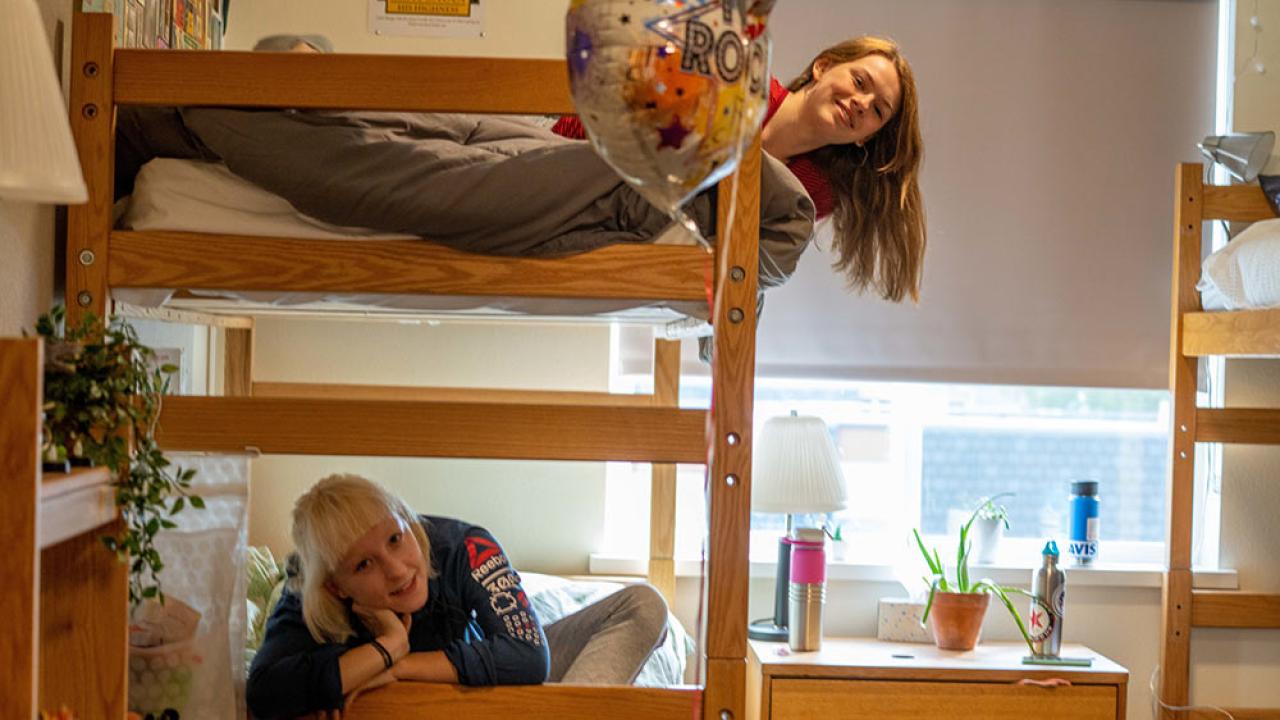
Although the journey from my hometown to UC Davis only takes 30 minutes, walking onto campus for the first time was like entering a different world. Thousands of new faces, eclectic traditions, sleek architecture, wild turkeys, and a sense of freedom — it was unlike anything I experienced in high school.
And college is different from high school — filled with different experiences, resources, and opportunities that will shape who you are. Every student has been where you are now, myself included. And although UC Davis and its staff are more than prepared to guide you through this next chapter, I want to offer you some of my personal experiences, so you’ll find yourself familiar with the campus you step onto in the Fall.
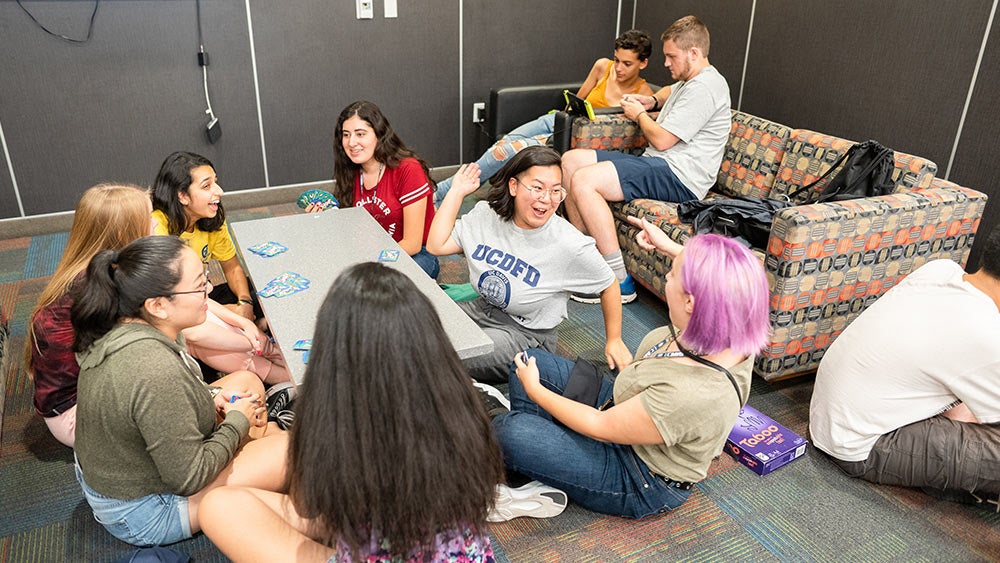
Life away from home
Life in college dorms is fun: Think about all the euphoric montages you’ve seen in movies and television, the get-togethers, and the iconic nights. You can find those at UC Davis. No matter where you end up living on-campus , you'll quickly find great Aggie spirit in every dorm.
While you’ll be ready to take on the tasks of independent life, college life means thinking about what your needs are outside of school.
If mom used to make your lunches in high school, then you might consider the Tercero Residence Hall, which boasts two separate dining commons, including one specializing in international cuisine.
Has a gym routine been a constant part of your high school life? Segundo boasts a close distance to the Activities and Recreation Center as well as the basketball courts and the Student Health and Wellness Center .
If independence is what you seek, Cuarto Hall might be for you. Residents live in suites with adjoining single rooms, located closest to downtown Davis.
It’s normal to feel overwhelmed by the new responsibilities you have, whether to yourself or to your new roommates. A time-honored stress reliever for students all over campus is petting the Tercero cows. It’s easy to let your worries get washed away petting a curious heifer. Caution: They do drool.

Academic freedom
Adjusting to the UC quarter system can be a change, especially if you're used to block and semester systems.
Separated into Fall, Winter, and Spring quarters, each ten weeks long, with Summer split into two optional smaller quarters, you’ll have ample opportunity to explore a wide variety of classes.
Among my favorite classes from the last few quarters have been Shakespeare in Popular Culture, Environmental Justice, Healthcare Economics, and Climate Change Fiction. And that’s not even counting unique general education courses like Coffee-Making, Wine Tasting, or Tractor Driving.
It can be surprising how much faster time passes by in college. Completing three to four classes in ten weeks means the first day of class blurs to midterms, and the midterms quickly blur into finals. Doing the assigned work at the pace of the quarter system can be challenging, but let me tell you, cramming it all in at the last minute is far more painful.
Luckily, as a college student, you have more academic freedom than in high school ; the syllabus handed out in every class lists all the upcoming homework and test deadlines, hugely helpful in planning which week to study in the Shields Library and which week to take a camping trip with friends. And if you find yourself on the heels of a busy quarter, you always have the option to pick a smaller course load.
Time management in college
Instead of back-to-back classes with your free time measured in minutes, what you do between college lectures is entirely up to you. It’s a double-edged sword: more time means having to balance the things you want to do with the things you need to do, and sometimes I mistake an extra slice of pizza from the CoHo right before class as the latter.
Whether you need to decompress or study, the sheer quantity of available spaces for students on campus means that planning your day the way you want is easy. I might take a moment to sunbathe on the lawn of the Quad, surrounded by circles of students chatting or playing spikeball, before dropping into the Student Community Center to print out an essay at the Computer Lab, and then pause by Lake Spafford to watch the wildlife.
And unlike high school, your choices aren’t just limited to campus, either; downtown Davis is just a few minutes walk away from the heart of campus, with a host of coffee shops that pepper the Davis streets. I prefer Mishka’s, but every college student finds their own preferred place to study and sip. But be warned: you will be judged on your favorite.
Working in your field
Many high school students come into college with part-time job experience. But being on a top-tier research campus means that opportunities for jobs and research can be paid as well as helpful in exploring the career field you’re interested in.
As a student studying English, I was able to work as a student writer at UC Davis’ Energy and Efficiency Institute, as well as Strategic Communications, learning to apply the writing skills I’ve polished in classes.
And academically, UC Davis offers fellowships and scholarships intended to get students familiar with the research in academia, whether you’re a STEM student or a humanities student like me. I’ve been able to travel to the Huntington Library in Los Angeles and present an academic paper at the UC Davis Research Colloquium thanks to the funding and advice available to me and every student interested in research.
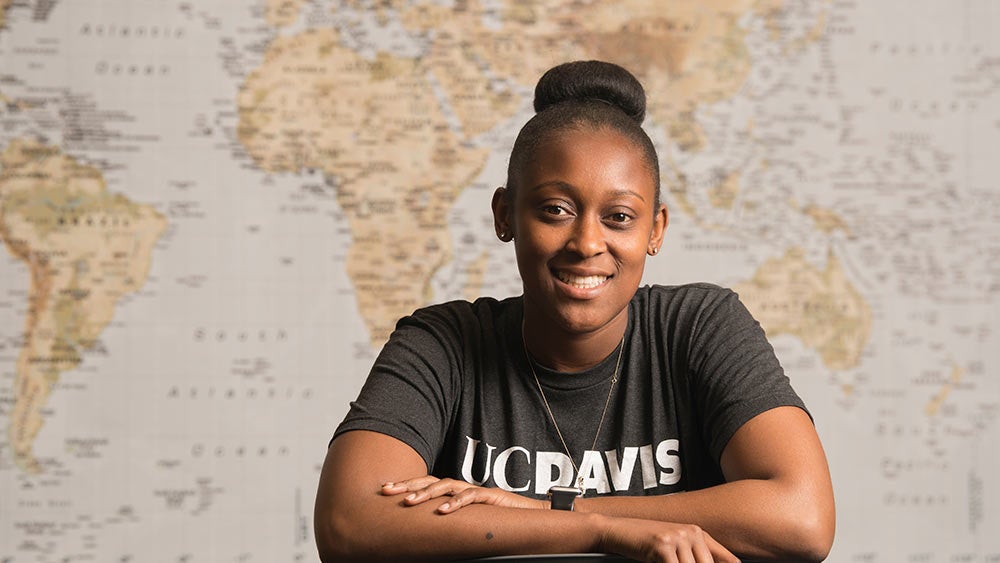
Seeing the world
Chances are, college already presents you a chance to be away from home.
College offers you another chance to be away from home; to visit another country entirely! Every department offers students a chance to enroll in UC Davis classes at universities around the globe , such as Design in Japan, Biological Sciences in Ireland, and English in London. Additionally, the Global Learning Hub is dedicated to sending students to pursue internships, research, and other academic opportunities across the globe, specializing in placements for students studying International Relations or Political Sciences.
Primary Category
Talk to our experts
1800-120-456-456
- College Life Essay

Anticipated Experiences During Our College Life
College Life is one of the most remarkable and lovable times of an individual's life. Unlike School Life, College Life has a different experience, and a person needs to have this experience in his/her life. College Life exposes us to whole new experiences which we always dream of experiencing after our school life. Lucky are those who get the chance to enjoy their college life, as many people don't get this chance due to their circumstances or financial issues. For every person, College Life has a different meaning. While some people spend their college life partying with friends, others become more cautious about their careers and study hard. Whatever the way, every individual enjoys their college life and always wishes to relive that time once it is over.
College Life Experience: How is it different from School Life?
Both school life and college life is the most memorable time of a person's life, but both of them are quite different from each other. While in School life, we learn everything in a protected environment, College Life exposes us to a new environment where we have to learn new things and face new challenges by ourselves. We spend half of our young lives in school, and thus we get comfortable living in that environment. But College Life is for three years only, where every year introduces new challenges and lessons to us. While in school, our teachers and friends always protect and guard us, in college life we form a relationship with our mentors, and they don't protect us all the time as our school teachers did.
Unlike school life, we don't have many limitations in college life, and it is up to us how we want to spend our college life. In college life, we see new faces and experience a unique environment in which we have to mingle ourselves. We make new friends there who stay with us for the rest of our lives. Also, we get a chance to shape our careers asking the right decisions and studying hard. College life is not only about the study but also about the overall development of an individual through various activities and challenges.
In College Life, one gets a chance to make their own decisions. In school life, students get an opportunity to be class monitors. In College Life, an individual gets a chance to nominate himself/herself for more prominent positions like College President, Vice President, Secretary, and Vice Secretary. Apart from deciding the course and stream, an individual gets a chance to build his/her confidence by being a part of various societies and events that take place all year.
Different from School Life, College Life has its importance in a person's life, and one should always enjoy his/her college life.
A Bridge Between Our Student and Adult Lives
College life is considered a bridge in our lives between our school days and our career. It prepares us with the finest academics and platform to generate dreams into realities. It acts as a transition to prepare us to be more independent. In school, we were dependent on our parents. However, we became independent in college regarding studying, traveling, decision-making, and financially independent after college. It is a valued and very smooth transition where we do not realize that we have become independent.
Some Fun Memories from College Life
Firstly, some of the most fun memories of college are “college canteen”. The canteen is supposed to be where most of the students satisfy their hunger and hang out with their friends.
Secondly, it’s the “annual fest” of the colleges. Fests always filled the student’s life with excitement and buzz. It gave new opportunities to explore, compare, compete and provide a platform to showcase their talent. It became a place where students take lots of pictures and record their experiences.
Last but not the least, it’s the college trips. One of the best things in college life is field trips where they can go out and have quality time with their friends and teacher and learning experience. Field trips or just any other college trips are filled with stories and dramas. Every student has their own story to tell about their college trips.
We should enjoy our college days as they cannot be brought back just like our school days.
The Hardest Part of College Life
As a college student, the hardest part of college life was leaving college after graduation or post-graduation. The last days of college were the hardest, knowing that soon you will be departing your friends, the campus, teachers and completely leaving behind a part of life.
My College Days Experience
Talking about my college life, I had enjoyed my college life to the fullest and had some of the best college days of my life. I was a student of one of the most reputed colleges of Delhi University and, i.e. Gargi College. I have completed my B.A. (Hons.) in Applied Psychology from there. Gargi College is one of the renowned and best colleges of Delhi University. Built in a larger area, it is a beautiful college with many courses in streams like Science, Commerce, Arts, and Humanities. With an outstanding academic record, it is a girls college.
When I took admission to this college, I was really afraid as all the people were new to me. But soon, I started enjoying my college life and made some fantastic friends. I loved everything about my college and participated in the events at my college. Even I joined the dance society of my college and participated in many dance competitions that occurred in different colleges of Delhi University.
One of the best things about college life is that you get a new experience every day. In my college life, along with studying, I and my friends enjoyed a lot of other things. We traveled to lots of places, had new experiences, and learned many new things. Our college's canteen was a remarkable place in my college life as whenever we got time, we used to chill in the canteen.
Another thing I loved about my college life is Annual Fests. Every year, every college of Delhi University organizes an annual fest that lasts for 2-3 days. In this annual fest, various competitions happen, and students from various colleges come to be a part of this annual fest. Every year, our college organizes a massive annual fest and all the students of our college participate in various events and enjoy a lot in this fest. These fests allow students to socialize with new people and showcase their talent to everyone which builds their confidence and helps them in their future. I have participated in my college's annual fest for all three years, and I have got the best exposure and experience of my life through this fest. I had the best time of my life in college, and my college life memories will always make me happy.
Life After College
One fine day, you will be silently smiling with wet eyes, looking at the pictures from your college and old friends, and remembering all the good times you had in your college days. That is the beauty of studying in a college. Despite climbing the ladders of success, you will cherish the memories of your college life.
College Life is a remarkable and essential time in a person's life, and everyone should enjoy it. College Life teaches us many things and builds our confidence to face the challenges and struggles in our future. Instead of just focussing on the study, a person must participate in other activities and socialize as much as possible in his/her college life as all these things help in the overall development of a person.

FAQs on College Life Essay
Q1. What is the difference between college life and school life?
When compared to each other, they both are completely different from each other. College life provides us with different opportunities to explore to nurture our confidence in the outside world. In school, the teacher acts as a monitor whereas, in college, they act like our friends, and not to forget, in college, we face more challenges than we had in our school.
Q2. Explain some of the common memories of college life.
Whenever you hear the word college, the first thing that comes to our mind is “college canteen”. The most beloved place for every student was to feed their empty stomach, spend time with friends, and create thousands of memories. Another most common memory is of the annual fest that bought buzz in every student’s life.
Q3. Why are colleges necessary?
When we go to school, they ensure that we have common educational knowledge. Whereas in college, we get specialization in a particular field we want to pursue as our career. That’s the reason our school friends get scattered in various colleges to make their dreams a reality and open better career options.
Q4. Which two things need to be focused on the most in college?
The two most important things in college are the Grade Point Average (GPA) and your participation in other co-curricular activities.
- Share full article
Advertisement
Supported by
Student Opinion
310 Prompts for Argumentative Writing
Questions on everything from mental health and sports to video games and dating. Which ones inspire you to take a stand?

By Natalie Proulx
Does social media harm young people’s mental health? Do video games deserve the bad rap they often get? Should parents track their children? Who is the greatest athlete of all time?
Every school day, we publish new questions for students based on the news of the day, including prompts, like these, that inspire persuasive writing.
Below, we’ve rounded up over 300 of those argumentative prompts, organized by topic, all in one place. They cover everything from parenting and schools to music and social media. Each one, drawn from our Student Opinion column , links to a free New York Times article as well as additional subquestions that can help you think more deeply about it.
You can use these prompts however you like, whether to inspire an entry for our new Open Letter Contest , to hone your persuasive writing skills or simply to share your opinions on the issues of today. So scroll through the list below and see which ones inspire you to take a stand.
If you enjoy these questions, know that you can find all of our argumentative writing prompts, as they publish, here . Students 13 and up from anywhere in the world are invited to comment.
Argumentative Prompt Topics
Technology and social media, college, work and money, health and relationships, gender and race, arts and entertainment, parenting and childhood, government and politics, animals, science and time.
Social Media
1. Does Social Media Harm Young People’s Mental Health? 2. How Much Should Speech Be Moderated on Social Media? 3. Should the United States Ban TikTok? 4. How Young Is Too Young to Use Social Media? 5. Should Kids Be Social Media Influencers? 6. What Should Be Done to Protect Children Online? 7. Should There Be Separate Social Media Apps for Children? 8. Are You a Fan of ‘School Accounts’ on Social Media? 9. Will Social Media Help or Hurt Your College and Career Goals? 10. Is It Ever OK to Use Strangers as Content for Social Media?
Phones and Devices
11. Should More Teenagers Ditch Their Smartphones? 12. Should the Adults in Your Life Be Worried by How Much You Use Your Phone? 13. Should Phones Ever Be a Part of Family or Holiday Gatherings? 14. What Are Your Texting Dos and Don’ts? 15. Does Grammar Still Matter in the Age of Twitter? 16. Is Your Phone Love Hurting Your Relationships? 17. Should Texting While Driving Be Treated Like Drunken Driving? 18. How Young Is Too Young for an Apple Watch?
The Internet
19. Do Memes Make the Internet a Better Place? 20. How Excited Are You About the Metaverse? 21. Should Websites Force Users to Prove How Old They Are? 22. What Is the Best Way to Stop Abusive Language Online? 23. How Do You Feel About Cancel Culture? 24. Does Online Public Shaming Prevent Us From Being Able to Grow and Change? 25. Do You Think Online Conspiracy Theories Can Be Dangerous? 26. Does Technology Make Us More Alone?
School Discipline and Attendance
27. Should Schools Ban Cellphones? 28. How Should Schools Hold Students Accountable for Hurting Others? 29. What Are Your Thoughts on Uniforms and Strict Dress Codes? 30. Should Schools Test Their Students for Nicotine and Drug Use? 31. How Can Schools Engage Students Who Are at Risk of Dropping Out? 32. Should Students Be Allowed to Miss School for Mental Health Reasons? 33. Should Your School Day Start Later? 34. Should There Still Be Snow Days? 35. Do Kids Need Recess? 36. Should Students Be Punished for Not Having Lunch Money?
School Quality and Effectiveness
37. How Do You Think American Education Could Be Improved? 38. Do Schools Need to Do More to Hold Students Accountable? 39. Are Straight A’s Always a Good Thing? 40. Should Students Have the Same Teachers Year After Year? 41. Do Teachers Assign Too Much Homework? 42. Should We Get Rid of Homework? 43. Should We Eliminate Gifted and Talented Programs? 44. Is It Time to Get Rid of Timed Tests? 45. What Role Should Textbooks Play in Education? 46. How Should Senior Year in High School Be Spent? 47. Does Your School Need More Money? 48. Do School Employees Deserve More Respect — and Pay? 49. Should Public Preschool Be a Right for All Children?
Teaching and Learning
50. Do You Think We Need to Change the Way Math Is Taught? 51. Should Financial Literacy Be a Required Course in School? 52. Should Schools Teach Students Kitchen and Household Skills? 53. Do We Need Better Music Education? 54. What Are the Most Important Things Students Should Learn in School? 55. What Is the Purpose of Teaching U.S. History? 56. Do Schools Need to Do More to Support Visual Thinkers? 57. Is School a Place for Self-Expression? 58. Should Media Literacy Be a Required Course in School? 59. Can Empathy Be Taught? Should Schools Try to Help Us Feel One Another’s Pain? 60. Should Schools Teach You How to Be Happy? 61. Should All Schools Teach Cursive? 62. Should Kids Still Learn to Tell Time? 63. How Important Is Knowing a Foreign Language
Technology in School
64. How Should Schools Respond to ChatGPT? 65. Does Learning to Be a Good Writer Still Matter in the Age of A.I.? 66. Is Online Learning Effective? 67. Should Students Be Monitored When Taking Online Tests? 68. Should Schools Be Able to Discipline Students for What They Say on Social Media? 69. Can Social Media Be a Tool for Learning and Growth in Schools? 70. Should Facial Recognition Technology Be Used in Schools? 71. Is Live-Streaming Classrooms a Good Idea? 72. Should Teachers and Professors Ban Student Use of Laptops in Class? 73. Are the Web Filters at Your School Too Restrictive?
Education Politics
74. Do You Feel Your School and Teachers Welcome Both Conservative and Liberal Points of View? 75. Should Students Learn About Climate Change in School? 76. Should Teachers Provide Trigger Warnings for ‘Traumatic Content’? 77. Should Teachers Be Allowed to Wear Political Symbols? 78. What Do You Think About Efforts to Ban Books From School Libraries? 79. What Is Your Reaction to the Growing Fight Over What Young People Can Read? 80. What Do You Think About the Controversy Surrounding the New A.P. Course on African American Studies? 81. Should Schools or Employers Be Allowed to Tell People How They Should Wear Their Hair? 82. Does Prayer Have Any Place in Public Schools? 83. Should Schools Be Allowed to Censor Student Newspapers?
College Admissions
84. Should Colleges Consider Standardized Tests in Admissions? 85. Should Students Let ChatGPT Help Them Write Their College Essays? 86. What Is Your Reaction to the End of Race-Based Affirmative Action in College Admissions? 87. Are Early-Decision Programs Unfair? Should Colleges Do Away With Them? 88. Is the College Admissions Process Fair? 89. How Much Do You Think It Matters Where You Go to College? 90. Should Everyone Go to College? 91. Should College Be Free? 92. Is Student Debt Worth It? 93. Should High Schools Post Their Annual College Lists?
Campus Life
94. What Should Free Speech Look Like on Campus? 95. Should Greek Life on College Campuses Come to an End? 96. Should Universities Work to Curtail Student Drinking? 97. How Should the Problem of Sexual Assault on Campuses Be Addressed? 98. Are Lavish Amenities on College Campuses Useful or Frivolous? 99. Should ‘Despised Dissenters’ Be Allowed to Speak on College Campuses? 100. Should Emotional Support Animals Be Allowed on College Campuses?
Jobs and Careers
101. Is High School a Good Time to Train for a Career? 102. Is There Such a Thing as a ‘Useless’ College Major? 103. Should All High School Students Have Part-Time Jobs? 104. Should National Service Be Required for All Young Americans? 105. Is It OK to Use Family Connections to Get a Job?
Money and Business
106. Do You Think the American Dream Is Real? 107. Should All Young People Learn How to Invest in the Stock Market? 108. Should We All Go Cashless? 109. When Should You Tip? 110. Should We End the Practice of Tipping? 111. Are You a Crypto Optimist or Skeptic? 112. Do Celebrities and Influencers Make You Want to Buy What They’re Selling? 113. Is $1 Billion Too Much Money for Any One Person to Have? 114. Are C.E.O.s Paid Too Much? 115. Is It Immoral to Increase the Price of Goods During a Crisis? 116. What Should Stores Do With Unsold Goods? 117. Is There a ‘Right Way’ to Be a Tourist? 118. Who Should We Honor on Our Money?
Mental Health
119. Is Teen Mental Health in a State of Crisis? 120. ‘Love-Bombing.’ ‘Gaslighting.’ ‘Victim.’ Is ‘Trauma Talk’ Overused? 121. Does Achieving Success Always Include Being Happy? 122. Is Struggle Essential to Happiness? 123. Should Schools Teach Mindfulness? 124. How Can We Bring an End to the ‘Epidemic of Loneliness’? 125. Does Every Country Need a ‘Loneliness Minister’? 126. What Ideas Do You Have to Bring Your Community Closer Together? 127. Are Emotional-Support Animals a Scam? 128. Is It OK to Laugh During Dark Times?
Dating and Relationships
129. Who Should Pay for Dates? 130. Do Marriage Proposals Still Have a Place in Today’s Society? 131. Should Your Significant Other Be Your Best Friend? 132. How Do You Think Technology Affects Dating?
Physical Health
133. Should Governments Do More to Discourage People From Smoking and Vaping? 134. How Should Adults Talk to Kids About Drugs? 135. Can Laziness Be a Good Thing? 136. Should There Be Requirements for Teens Who Want to Ride E-Bikes? 137. What Advice Should Parents and Counselors Give Teenagers About Sexting? 138. Should All Children Be Vaccinated? 139. Do We Worry Too Much About Germs?
140. Is It Becoming More Acceptable for Men and Boys to Cry? 141. Is It Harder for Men and Boys to Make and Keep Friends? 142. Should Award Shows Eliminate Gendered Categories? 143. Should There Be More Gender Options on Identification Documents? 144. Justice Ginsburg Fought for Gender Equality. How Close Are We to Achieving That Goal? 145. What Should #MeToo Mean for Teenage Boys? 146. What Is Hard About Being a Boy? 147. Should There Be More Boy Dolls? 148. Is Single-Sex Education Still Useful? 149. Are Beauty Pageants Still Relevant? 150. Should Period Products Be Free? 151. What Are Your Thoughts on Last Names? 152. What Rules Should Apply to Transgender Athletes When They Compete? 153. What Is Your Reaction to the Recent Wave of Legislation That Seeks to Regulate the Lives of Transgender Youths? 154. What Do You Wish Lawmakers Knew About How Anti-L.G.B.T.Q. Legislation Affects Teenagers?
Identity, Race and Ethnicity
155. How Should Schools Respond to Racist Jokes? 156. How Should Parents Teach Their Children About Race and Racism? 157. What Is Your Reaction to Efforts to Limit Teaching on Race in Schools? 158. How Should Racial Slurs in Literature Be Handled in the Classroom? 159. Should Confederate Statues Be Removed or Remain in Place? 160. Should We Rename Schools Named for Historical Figures With Ties to Racism, Sexism or Slavery? 161. How Should We Remember the Problematic Actions of the Nation’s Founders? 162. Does the United States Owe Reparations to the Descendants of Enslaved People? 163. What Can History Teach Us About Resilience? 164. Should All Americans Receive Anti-Bias Education? 165. Is Fear of ‘The Other’ Poisoning Public Life? 166. What Stereotypical Characters Make You Cringe? 167. When Talking About Identity, How Much Do Words Matter? 168. How Useful Is It to Be Multilingual?
TV and Movies
169. Is True Crime As a Form of Entertainment Ethical? 170. Should Old TV Shows Be Brought Back? 171. Does Reality TV Deserve Its Bad Rap? 172. How Closely Should Actors’ Identities Reflect the Roles They Play? 173. In the Age of Digital Streaming, Are Movie Theaters Still Relevant? 174. Do We Need More Female Superheroes? 175. Is Hollywood Becoming More Diverse? 176. When Does Lying in Comedy Cross a Line? 177. How Do You Feel About ‘Nepotism Babies’?
Music and Video Games
178. Will A.I. Replace Pop Stars? 179. If Two Songs Sound Alike, Is It Stealing? 180. Should Musicians Be Allowed to Copy or Borrow From Other Artists? 181. How Do You Feel About Censored Music? 182. What Are the Greatest Songs of All Time? 183. Do Video Games Deserve the Bad Rap They Often Get? 184. Should There Be Limits on How Much Time Young People Spend Playing Video Games? 185. Should More Parents Play Video Games With Their Kids?
186. Are A.I.-Generated Pictures Art? 187. What Work of Art Should Your Friends Fall in Love With? 188. If Artwork Offends People, Should It Be Removed? 189. Should Museums Return Looted Artifacts to Their Countries of Origin? 190. Should Art Come With Trigger Warnings? 191. Is the Digital Era Improving or Ruining the Experience of Art? 192. Are Museums Still Important in the Digital Age? 193. Can You Separate Art From the Artist? 194. Are There Subjects That Should Be Off-Limits to Artists, or to Certain Artists in Particular? 195. Should Graffiti Be Protected?
Books and Literature
196. Is Listening to a Book Just as Good as Reading It? 197. Should Classic Children’s Books Be Updated for Today’s Young Readers? 198. Should White Writers Translate a Black Author’s Work? 199. Is There Any Benefit to Reading Books You Hate? 200. Should Libraries Get Rid of Late Fees?
201. What’s the Best — and Worst — Part of Being a Sports Fan? 202. Who Is the GOAT? 203. Do Women’s Sports Deserve More Attention? 204. What Should Be Done About the Gender Pay Gap in Sports? 205. Should Girls and Boys Sports Teams Compete in the Same League? 206. Should More Sports Be Coed? 207. College Athletes Can Now Be Paid. But Not All of Them Are Seeing Money. Is That Fair? 208. Should High School-Age Basketball Players Be Able to Get Paid? 209. Are Some Youth Sports Too Intense? 210. Are Youth Sports Too Competitive? 211. Is It Bad Sportsmanship to Run Up the Score in Youth Sports? 212. Is It Ethical to Be a Football Fan? 213. Does the N.F.L. Have a Race Problem? 214. What New Rules Would Improve Your Favorite Sport? 215. What Sports Deserve More Hype? 216. How Should We Punish Sports Cheaters? 217. Should Technology in Sports Be Limited? 218. Does Better Sports Equipment Unfairly Improve Athletic Ability? 219. Is It Offensive for Sports Teams and Their Fans to Use Native American Names, Imagery and Gestures? 220. Is It Selfish to Pursue Risky Sports Like Extreme Mountain Climbing? 221. Should Cheerleading Be an Olympic Sport?

Related Writing Prompt
222. Should Parents Ever Be Held Responsible for the Harmful Actions of Their Children? 223. Where Is the Line Between Helping a Child Become More Resilient and Pushing Them Too Hard? 224. Should Parents Give Children More Responsibility at Younger Ages? 225. Should Parents Tell Children the Truth About Santa? 226. Should Parents Weigh in on Their Kids’ Dating Lives? 227. Should Parents Track Their Children? 228. How Should Parents Support a Student Who Has Fallen Behind in School? 229. Do Parents Ever Cross a Line by Helping Too Much With Schoolwork? 230. What’s the Best Way to Discipline Children? 231. What Are Your Thoughts on ‘Snowplow Parents’? 232. Should Stay-at-Home Parents Be Paid? 233. Should Parents Bribe Their Children?
Childhood and Growing Up
234. Is It Harder to Grow Up in the 21st Century Than It Was in the Past? 235. Is Childhood Today Over-Supervised? 236. When Do You Become an Adult? 237. Who Should Decide Whether a Teenager Can Get a Tattoo or Piercing? 238. Do We Give Children Too Many Trophies? 239. What Can Older Generations Learn From Gen Z? 240. What Is the Worst Toy Ever?
Legislation and Policy
241. Should the Death Penalty Be Abolished? 242. Should Marijuana Be Legal? 243. Should the United States Decriminalize the Possession of Drugs? 244. What Is Your Reaction to the State of Abortion Rights? 245. Should the Government Cancel Student Debt? 246. Should Public Transit Be Free? 247. Should There Be More Public Restrooms? 248. Should the U.S. Be Doing More to Prevent Child Poverty? 249. Should the Government Provide a Guaranteed Income for Families With Children? 250. Should Law Enforcement Be Able to Use DNA Data From Genealogy Websites for Criminal Investigations?
Gun Violence
251. Are You Concerned About Violence in America? 252. How Should Americans Deal With the Problem of Gun Violence? 253. What Should Lawmakers Do About Guns and Gun Violence? 254. Should the U.S. Ban Military-Style Semiautomatic Weapons? 255. Should Teachers Be Armed With Guns?
Voting and Elections
256. How Much Faith Do You Have in the U.S. Political System? 257. Is the Electoral College a Problem? Does It Need to Be Fixed? 258. Does Everyone Have a Responsibility to Vote? 259. Should We All Be Able to Vote by Mail? 260. Should There Be a Minimum Voting Age? 261. Should the Voting Age Be Lowered to 16? 262. Should Ex-Felons Have the Right to Vote? 263. Are Presidential Debates Helpful to Voters? Or Should They Be Scrapped?
Freedoms and Rights
264. How Important Is Freedom of the Press? 265. Why Does the Right to Protest Matter? 266. Does the U.S. Constitution Need an Equal Rights Amendment? 267. Do You Care Who Sits on the Supreme Court? Should We Care? 268. Should You Have a Right to Be Rude? 269. Should Prisons Offer Incarcerated People Education Opportunities?
Civic Participation
270. Are You Optimistic About the State of the World? 271. If You Could Take On One Problem Facing Our World, What Would It Be? 272. If You Were Mayor, What Problems Facing Your Community Would You Tackle? 273. Do You Think Teenagers Can Make a Difference in the World? 274. Do You Think It Is Important for Teenagers to Participate in Political Activism? 275. Is Your Generation Doing Its Part to Strengthen Our Democracy? 276. How Is Your Generation Changing Politics? 277. Why Is It Important for People With Different Political Beliefs to Talk to Each Other? 278. Are We Being Bad Citizens If We Don’t Keep Up With the News? 279. Why Do Bystanders Sometimes Fail to Help When They See Someone in Danger? 280. When Is It OK to Be a Snitch? 281. Should Reporters Ever Help the People They Are Covering? 282. Should Celebrities Weigh In on Politics? 283. Should Athletes Speak Out On Social and Political Issues? 284. Should Corporations Take Political Stands? 285. What Do You Think the Role of the First Lady — or First Spouse — Should Be Today?
286. Is Animal Testing Ever Justified? 287. What Is Our Responsibility to Lab Animals? 288. What Are Your Thoughts About Hunting Animals? 289. Should We Be Concerned With Where We Get Our Pets? 290. What Do You Think of Pet Weddings? 291. Is It Wrong to Focus on Animal Welfare When Humans Are Suffering? 292. Should We Bring Back Animals From Extinction? 293. Are Zoos Immoral? 294. Do Bugs Deserve More Respect?
Environment and Science
295. What Role Should Young People Play in the Fight Against Climate Change? 296. Should We Be More Optimistic About Efforts to Combat Climate Change? 297. How Far Is Too Far in the Fight Against Climate Change? 298. Should Plastic Bags Be Banned Everywhere? 299. Is It Ethical to Create Genetically Edited Humans? 300. Should We Still Be Sending Astronauts to Space? 301. Do You Think Pluto Should Be a Planet? 302. Should We Treat Robots Like People?
Time and Seasons
303. What Is the Best Month of the Year? What Is the Worst? 304. Would Life Be Better Without Time Zones? 305. Do You Think It Is Time to Get Rid of Daylight Saving Time? 306. When Do Holiday Decorations Go From Festive to Excessive? 307. Should We Rethink Thanksgiving? 308. When Does a Halloween Costume Cross the Line? 309. Should School Be a Place to Celebrate Halloween? 310. Should the Week Be Four Days Instead of Five?
Students 13 and older in the United States and Britain, and 16 and older elsewhere, are invited to comment. All comments are moderated by the Learning Network staff, but please keep in mind that once your comment is accepted, it will be made public and may appear in print.
Find more Student Opinion questions here. Teachers, check out this guide to learn how you can incorporate these prompts into your classroom.
Natalie Proulx joined The Learning Network as a staff editor in 2017 after working as an English language arts teacher and curriculum writer. More about Natalie Proulx
State should expand early college/dual enrollment programs for high school students
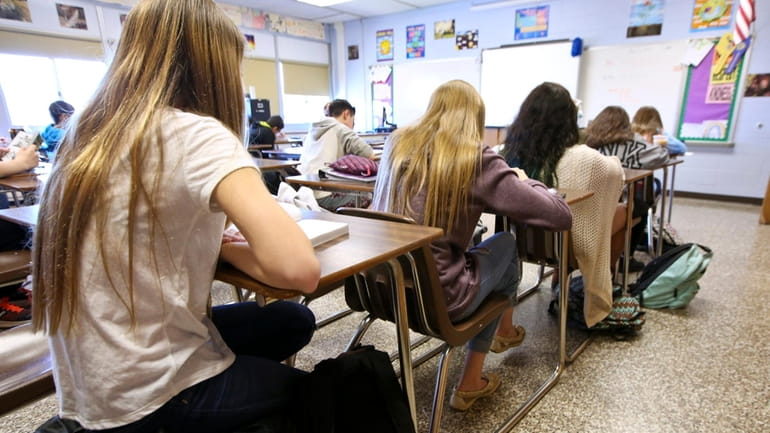
Early college/dual enrollment programs can be transformative for high school students. Credit: Newsday/John Paraskevas
High school students on Long Island and around the state have been able to earn college credits while still in high school for many years. Many school districts have outstanding programs through collaborations with colleges/universities.
Since college is so expensive and not always accessible to every student, it is time for New York to enter a new era of academic advancement. Early college/dual enrollment programs can be transformative for high school students by offering unique opportunities to amplify educational horizons and better equip students for the challenges that lie beyond the classroom.
Early college/dual enrollment programs allow students to simultaneously earn high school and college credit by taking courses at or offered by accredited colleges and universities. Our organization of school counselors provides guidance and recommendations for implementing and overseeing these programs across the state.
The New York State School Counselor Association believes these programs provide students with the opportunity to challenge themselves academically and that these programs should be available in all of New York's public schools. Though more than half of New York's high schools offer a dual enrollment program, only 15.8% of the state's high school students were enrolled in such a program in 2022, according to state Education Department data.
Access to these programs would help our high-schoolers make knowledgeable choices about their postsecondary education and career plans. This would enhance college accessibility and affordability by giving students a head start on their college education and thus saving students and their parents time and expense. This would, in turn, strengthen the partnership between our K-12 schools and colleges and universities.
From our Editorial Board, get inside the local, city and state political scenes.
By clicking Sign up, you agree to our privacy policy .
To make these programs rigorous, accessible, and equitable, we strongly suggest that the programs contain academic equivalence with the courses being offered to students by their high schools and that they be taught by qualified instructors with appropriate credentials and experience.
Also important is the factor of inclusivity. Dual enrollment programs should be inclusive and accessible to all students, regardless of their socioeconomic background, geography, race, gender, or abilities, and institutions must ensure that dual enrollment credits seamlessly transfer to colleges and universities within New York State.
It is critical that K-12 students have access to support services like counseling, academic advising, and academic support services to succeed in dual enrollment programs. Quality assurance should consist of regular evaluations and assessments of dual enrollment programs to maintain high-quality standards.
Administrative support is also crucial to success and to that end, we suggest creating an Office for Early College/Dual Enrollment Programs at the state Education Department with regional support centers and stable funding to support these initiatives.
Collaboration between K-12 schools, colleges, and universities is critical to foster successful dual enrollment programs. It is essential to establish clear communication channels, data-sharing agreements, and partnerships for program sustainability.
We advocate for policies that support dual enrollment programs, including pending legislation that provides TAP funding for school districts hosting dual enrollment programs and measures that promote equitable access for all students and provide resources and professional development opportunities for school counselors, educators, and administrators involved in dual enrollment to ensure best practices are followed.
The time to make this investment is now. Dual enrollment programs have the potential to significantly benefit New York State students in their pursuit of higher education and career success. We should do everything we can to help them on that journey.
This guest essay reflects the views of Robert Rotunda and Kelly Whitney-Rivera, executive director and advocacy & public policy chair, respectively, of the New York State School Counselor Association.
This guest essay reflects the views of Robert Rotunda and Kelly Whitney-Rivera, executive director and advocacy & public policy chair, respectively, of the New York State School Counselor Association.
WELCOME TO THE FAMILY! Please check your email for confirmation from us.
Sob stories? Trauma dumps? Black kids worry about writing college essays after affirmative action ban
When the Supreme Court ended affirmative action in higher education, it left the college essay as one of few places where race can play a role in admissions decisions.
- Share on Facebook
- Share on Twitter
- Share via Email
- Copy Link Link Copied
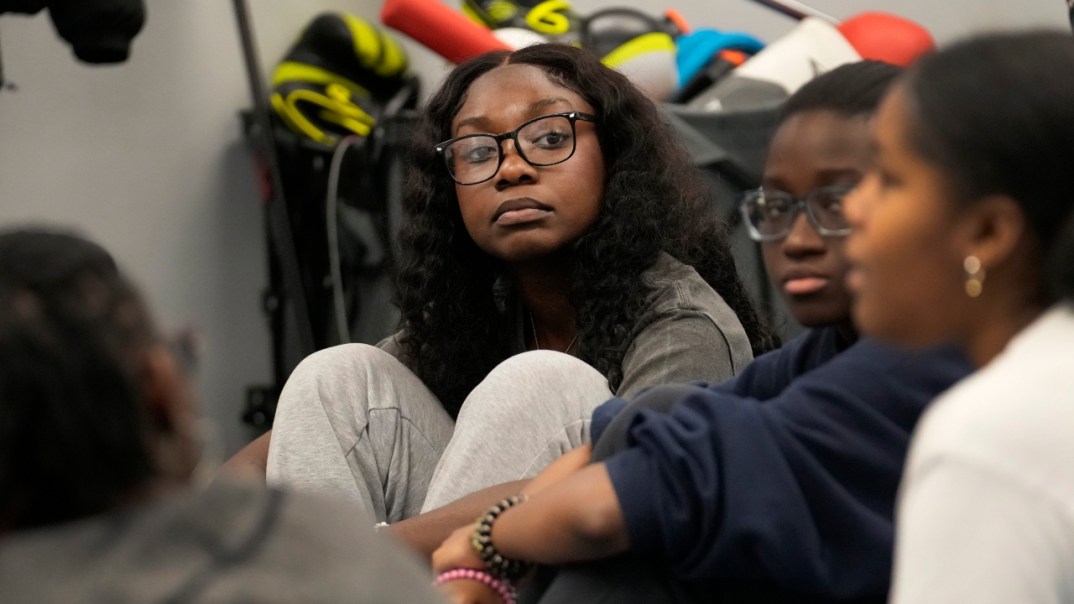
CHICAGO (AP) — When she started writing her college essay, Hillary Amofa told the story she thought admissions offices wanted to hear. About being the daughter of immigrants from Ghana and growing up in a small apartment in Chicago. About hardship and struggle.
Then she deleted it all.
“I would just find myself kind of trauma-dumping,” said the 18-year-old senior at Lincoln Park High School in Chicago. “And I’m just like, this doesn’t really say anything about me as a person.”
When the Supreme Court ended affirmative action in higher education , it left the college essay as one of few places where race can play a role in admissions decisions. For many students of color, instantly more was riding on the already high-stakes writing assignment. Some say they felt pressure to exploit their hardships as they competed for a spot on campus.
Amofa was just starting to think about her essay when the court issued its decision, and it left her with a wave of questions. Could she still write about her race? Could she be penalized for it? She wanted to tell colleges about her heritage but she didn’t want to be defined by it.
In English class, Amofa and her classmates read sample essays that all seemed to focus on some trauma or hardship. It left her with the impression she had to write about her life’s hardest moments to show how far she’d come. But she and some of her classmates wondered if their lives had been hard enough to catch the attention of admissions offices.
“For a lot of students, there’s a feeling of, like, having to go through something so horrible to feel worthy of going to school, which is kind of sad,” said Amofa, the daughter of a hospital technician and an Uber driver.
This year’s senior class is the first in decades to navigate college admissions without affirmative action. The Supreme Court upheld the practice in decisions going back to the 1970s, but this court’s conservative supermajority found it is unconstitutional for colleges to give students extra weight because of their race alone.
Still, the decision left room for race to play an indirect role: Chief Justice John Roberts wrote universities can still consider how an applicant’s life was shaped by their race, “so long as that discussion is concretely tied to a quality of character or unique ability.”
“A benefit to a student who overcame racial discrimination, for example, must be tied to that student’s courage and determination,” he wrote.
Scores of colleges responded with new essay prompts asking about students’ backgrounds. Brown University asked applicants how “an aspect of your growing up has inspired or challenged you.” Rice University asked students how their perspectives were shaped by their “background, experiences, upbringing, and/or racial identity.”
Wondering if schools ‘expect a sob story’
When Darrian Merritt started writing his essay, he knew the stakes were higher than ever because of the court’s decision. His first instinct was to write about events that led to him going to live with his grandmother as a child.
Those were painful memories, but he thought they might play well at schools like Yale, Stanford and Vanderbilt.
“I feel like the admissions committee might expect a sob story or a tragic story,” said Merritt, a senior in Cleveland. “And if you don’t provide that, then maybe they’re not going to feel like you went through enough to deserve having a spot at the university. I wrestled with that a lot.”
He wrote drafts focusing on his childhood, but it never amounted to more than a collection of memories. Eventually he abandoned the idea and aimed for an essay that would stand out for its positivity.
Merritt wrote about a summer camp where he started to feel more comfortable in his own skin. He described embracing his personality and defying his tendency to please others. The essay had humor — it centered on a water gun fight where he had victory in sight but, in a comedic twist, slipped and fell. But the essay also reflects on his feelings of not being “Black enough” and getting made fun of for listening to “white people music.”
“I was like, ‘OK, I’m going to write this for me, and we’re just going to see how it goes,’” he said. “It just felt real, and it felt like an honest story.”
The essay describes a breakthrough as he learned “to take ownership of myself and my future by sharing my true personality with the people I encounter. … I realized that the first chapter of my own story had just been written.”
A ruling prompts pivots on essay topics
Like many students, Max Decker of Portland, Oregon, had drafted a college essay on one topic, only to change direction after the Supreme Court ruling in June.
Decker initially wrote about his love for video games. In a childhood surrounded by constant change, navigating his parents’ divorce, the games he took from place to place on his Nintendo DS were a source of comfort.
But the essay he submitted to colleges focused on the community he found through Word is Bond, a leadership group for young Black men in Portland.
As the only biracial, Jewish kid with divorced parents in a predominantly white, Christian community, Decker wrote he constantly felt like the odd one out. On a trip with Word is Bond to Capitol Hill, he and friends who looked just like him shook hands with lawmakers. The experience, he wrote, changed how he saw himself.
Recommended Stories

Ahmaud Arbery’s killers seeking to overturn their hate crime convictions
Associated Press
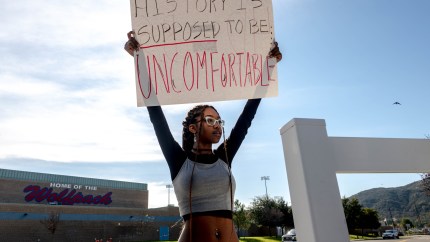
High school teacher and students sue over Arkansas’ ban on critical race theory
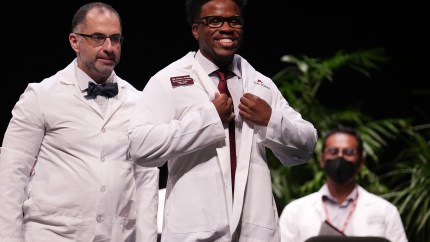
House Republicans aim to strip funding from medical schools over diversity programs
Ashlee Banks
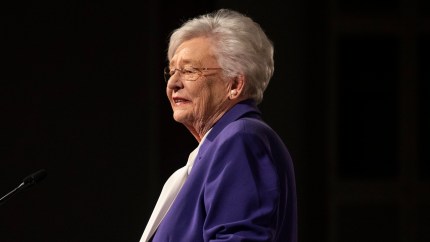
DEI programs and concepts that could make someone feel guilty about their race banned in Alabama
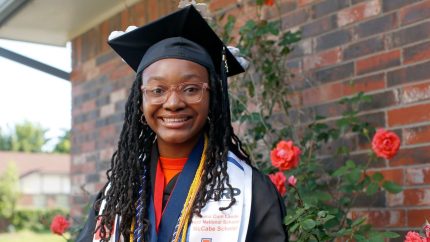
America’s youngest teacher is a 16-year-old MBA student
TheGrio Lifestyle

MF Doom and Madlib’s ‘Madvillainy’ — now 20 years old — is the timeless classic album we all thought it would be in 2004
Panama Jackson

Before heading ‘outside,’ spring-clean your finances in 4 steps
Jennifer Streaks
“It’s because I’m different that I provide something precious to the world, not the other way around,” he wrote.
As a first-generation college student, Decker thought about the subtle ways his peers seemed to know more about navigating the admissions process. They made sure to get into advanced classes at the start of high school, and they knew how to secure glowing letters of recommendation.
If writing about race would give him a slight edge and show admissions officers a fuller picture of his achievements, he wanted to take that small advantage.
His first memory about race, Decker said, was when he went to get a haircut in elementary school and the barber made rude comments about his curly hair. Until recently, the insecurity that moment created led him to keep his hair buzzed short.
Through Word is Bond, Decker said he found a space to explore his identity as a Black man. It was one of the first times he was surrounded by Black peers and saw Black role models. It filled him with a sense of pride in his identity. No more buzzcut.
The pressure to write about race involved a tradeoff with other important things in his life, Decker said. That included his passion for journalism, like the piece he wrote on efforts to revive a once-thriving Black neighborhood in Portland. In the end, he squeezed in 100 characters about his journalism under the application’s activities section.
“My final essay, it felt true to myself. But the difference between that and my other essay was the fact that it wasn’t the truth that I necessarily wanted to share,” said Decker, whose top college choice is Tulane, in New Orleans, because of the region’s diversity. “It felt like I just had to limit the truth I was sharing to what I feel like the world is expecting of me.”
Spelling out the impact of race
Before the Supreme Court ruling, it seemed a given to Imani Laird that colleges would consider the ways that race had touched her life. But now, she felt like she had to spell it out.
As she started her essay, she reflected on how she had faced bias or felt overlooked as a Black student in predominantly white spaces.
There was the year in math class when the teacher kept calling her by the name of another Black student. There were the comments that she’d have an easier time getting into college because she was Black.
“I didn’t have it easier because of my race,” said Laird, a senior at Newton South High School in the Boston suburbs who was accepted at Wellesley and Howard University , and is waiting to hear from several Ivy League colleges. “I had stuff I had to overcome.”
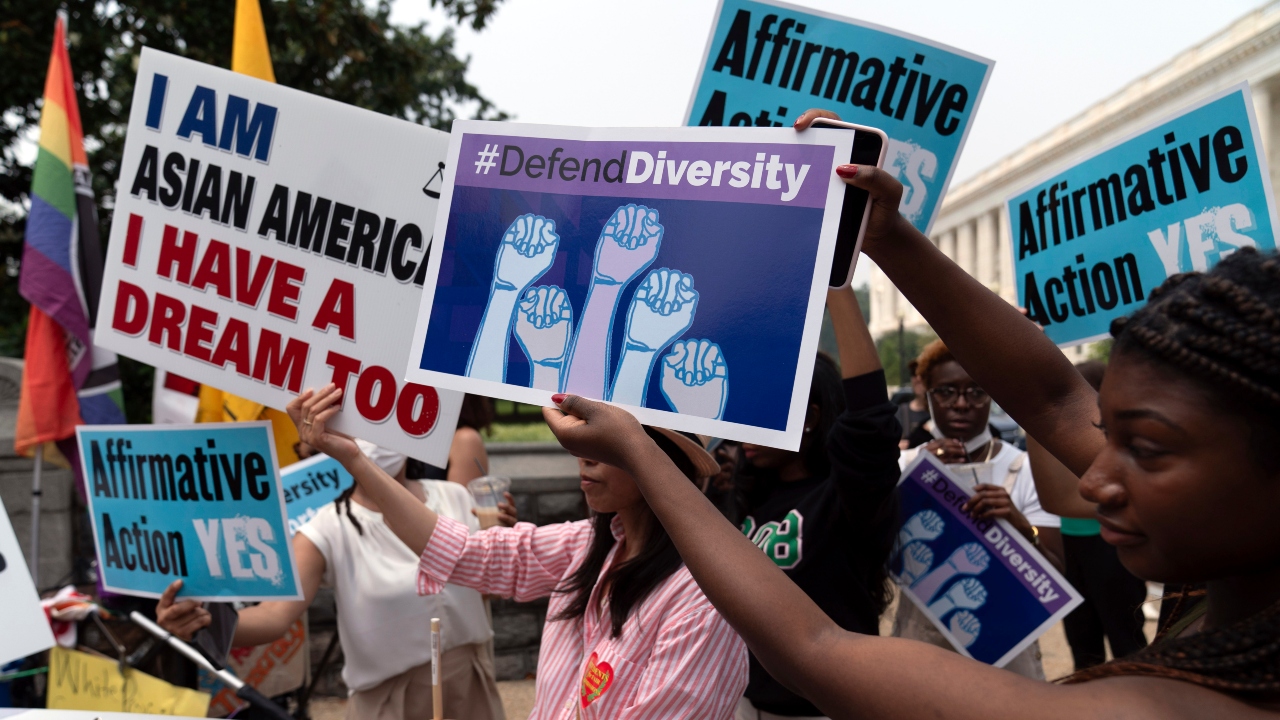
In her final essays, she wrote about her grandfather, who served in the military but was denied access to GI Bill benefits because of his race.
She described how discrimination fueled her ambition to excel and pursue a career in public policy.
“So, I never settled for mediocrity,” she wrote. “Regardless of the subject, my goal in class was not just to participate but to excel. Beyond academics, I wanted to excel while remembering what started this motivation in the first place.”
Will schools lose racial diversity?
Amofa used to think affirmative action was only a factor at schools like Harvard and Yale. After the court’s ruling, she was surprised to find that race was taken into account even at some public universities she was applying to.
Now, without affirmative action, she wondered if mostly white schools will become even whiter.
It’s been on her mind as she chooses between Indiana University and the University of Dayton, both of which have relatively few Black students. When she was one of the only Black students in her grade school, she could fall back on her family and Ghanaian friends at church. At college, she worries about loneliness.
“That’s what I’m nervous about,” she said. “Going and just feeling so isolated, even though I’m constantly around people.”
The first drafts of her essay focused on growing up in a low-income family, sharing a bedroom with her brother and grandmother. But it didn’t tell colleges about who she is now, she said.
Her final essay tells how she came to embrace her natural hair. She wrote about going to a mostly white grade school where classmates made jokes about her afro. When her grandmother sent her back with braids or cornrows, they made fun of those too.
Over time, she ignored their insults and found beauty in the styles worn by women in her life. She now runs a business doing braids and other hairstyles in her neighborhood.
“I stopped seeing myself through the lens of the European traditional beauty standards and started seeing myself through the lens that I created,” Amofa wrote.
“Criticism will persist, but it loses its power when you know there’s a crown on your head!”
Never miss a beat: Get our daily stories straight to your inbox with theGrio’s newsletter.
- Share on Facebook Facebook
- Share on Twitter Twitter
- Share via Email Email
- Copy Link Copy Link Link Copied

STREAM FREE MOVIES, LIFESTYLE AND NEWS CONTENT ON OUR NEW APP
- Crime And Law
- State And Regional
- Election 2024
- WHIO YouTube (Opens in new window)
- Dayton Gets Real (Opens in new window)
- Nation And World
- Israel At War
- Making a Difference
- Beat The Stigma (Opens in new window)
- Lottery Results
- Entertainment
- WHIO-TV Closed Captioning
- Interactive Radar
- Hour by Hour Forecast
- Closings & Delays Participation Info
- Total Eclipse 2024
- WHIO Weather 24/7 Stream
- Live Traffic Conditions
- Gas Prices: Pump Patrol (Opens in new window)
- WHIO 24/7 News
- The $pend $mart Stream
- Law & Crime
- Curiosity NOW
- Touchdown 7
- Orange Zone (Opens in new window)
- Cleveland Browns
- Dayton Flyers
- FIFA World Cup Soccer (Opens in new window)
- WHIO-TV 75 Years (Opens in new window)
- 7 Circle of Kindness
- About WHIO-TV
- Contests (Opens in new window)
- What's on WHIO-TV
- CBS Programming (Opens in new window)
- About Laff TV (Opens in new window)
- More Ways to Watch
- FAQ: WHIO TV & Radio
- FCC Applications
- Visitor Agreement
- Privacy Policy
- Program Lineup
- Ask The Experts
- Contact WHIO Radio
- Official Contest Rules
- How to Listen To WHIO Radio
- Radio Staff
- Steals and Deals
- Share Your Pics!
Should college essays touch on race? Some feel the affirmative action ruling leaves them no choice
Education-Affirmative Action Hillary Amofa listens to others member of the Lincoln Park High School step team after school Friday, March 8, 2024, in Chicago. When she started writing her college essay, Amofa told the story she thought admissions offices wanted to hear. She wrote about being the daughter of immigrants from Ghana, about growing up in a small apartment in Chicago. She described hardship and struggle. Then she deleted it all. "I would just find myself kind of trauma-dumping," said the 18 year-old senior, "And I'm just like, this doesn't really say anything about me as a person." (AP Photo/Charles Rex Arbogast) (Charles Rex Arbogast/AP)
CHICAGO — (AP) — When she started writing her college essay, Hillary Amofa told the story she thought admissions offices wanted to hear. About being the daughter of immigrants from Ghana and growing up in a small apartment in Chicago. About hardship and struggle.
Then she deleted it all.
“I would just find myself kind of trauma-dumping,” said the 18-year-old senior at Lincoln Park High School in Chicago. “And I’m just like, this doesn’t really say anything about me as a person.”
When the Supreme Court ended affirmative action in higher education, it left the college essay as one of few places where race can play a role in admissions decisions. For many students of color, instantly more was riding on the already high-stakes writing assignment. Some say they felt pressure to exploit their hardships as they competed for a spot on campus.
Amofa was just starting to think about her essay when the court issued its decision, and it left her with a wave of questions. Could she still write about her race? Could she be penalized for it? She wanted to tell colleges about her heritage but she didn’t want to be defined by it.
In English class, Amofa and her classmates read sample essays that all seemed to focus on some trauma or hardship. It left her with the impression she had to write about her life's hardest moments to show how far she'd come. But she and some of her classmates wondered if their lives had been hard enough to catch the attention of admissions offices.
“For a lot of students, there’s a feeling of, like, having to go through something so horrible to feel worthy of going to school, which is kind of sad,” said Amofa, the daughter of a hospital technician and an Uber driver.
This year's senior class is the first in decades to navigate college admissions without affirmative action . The Supreme Court upheld the practice in decisions going back to the 1970s, but this court's conservative supermajority found it is unconstitutional for colleges to give students extra weight because of their race alone.
Still, the decision left room for race to play an indirect role: Chief Justice John Roberts wrote universities can still consider how an applicant’s life was shaped by their race, “so long as that discussion is concretely tied to a quality of character or unique ability.”
“A benefit to a student who overcame racial discrimination, for example, must be tied to that student’s courage and determination,” he wrote.
Scores of colleges responded with new essay prompts asking about students’ backgrounds. Brown University asked applicants how “an aspect of your growing up has inspired or challenged you.” Rice University asked students how their perspectives were shaped by their “background, experiences, upbringing, and/or racial identity.”
When Darrian Merritt started writing his essay, he knew the stakes were higher than ever because of the court’s decision. His first instinct was to write about events that led to him going to live with his grandmother as a child.
Those were painful memories, but he thought they might play well at schools like Yale, Stanford and Vanderbilt.
“I feel like the admissions committee might expect a sob story or a tragic story,” said Merritt, a senior in Cleveland. “And if you don’t provide that, then maybe they’re not going to feel like you went through enough to deserve having a spot at the university. I wrestled with that a lot.”
He wrote drafts focusing on his childhood, but it never amounted to more than a collection of memories. Eventually he abandoned the idea and aimed for an essay that would stand out for its positivity.
Merritt wrote about a summer camp where he started to feel more comfortable in his own skin. He described embracing his personality and defying his tendency to please others. The essay had humor — it centered on a water gun fight where he had victory in sight but, in a comedic twist, slipped and fell. But the essay also reflects on his feelings of not being “Black enough” and getting made fun of for listening to “white people music."
“I was like, ‘OK, I’m going to write this for me, and we’re just going to see how it goes,’” he said. “It just felt real, and it felt like an honest story.”
The essay describes a breakthrough as he learned "to take ownership of myself and my future by sharing my true personality with the people I encounter. ... I realized that the first chapter of my own story had just been written.”
Like many students, Max Decker of Portland, Oregon, had drafted a college essay on one topic, only to change direction after the Supreme Court ruling in June.
Decker initially wrote about his love for video games. In a childhood surrounded by constant change, navigating his parents’ divorce, the games he took from place to place on his Nintendo DS were a source of comfort.
But the essay he submitted to colleges focused on the community he found through Word is Bond, a leadership group for young Black men in Portland.
As the only biracial, Jewish kid with divorced parents in a predominantly white, Christian community, Decker wrote he constantly felt like the odd one out. On a trip with Word is Bond to Capitol Hill, he and friends who looked just like him shook hands with lawmakers. The experience, he wrote, changed how he saw himself.
“It’s because I’m different that I provide something precious to the world, not the other way around,” he wrote.
As a first-generation college student, Decker thought about the subtle ways his peers seemed to know more about navigating the admissions process . They made sure to get into advanced classes at the start of high school, and they knew how to secure glowing letters of recommendation.
If writing about race would give him a slight edge and show admissions officers a fuller picture of his achievements, he wanted to take that small advantage.
His first memory about race, Decker said, was when he went to get a haircut in elementary school and the barber made rude comments about his curly hair. Until recently, the insecurity that moment created led him to keep his hair buzzed short.
Through Word is Bond, Decker said he found a space to explore his identity as a Black man. It was one of the first times he was surrounded by Black peers and saw Black role models. It filled him with a sense of pride in his identity. No more buzzcut.
The pressure to write about race involved a tradeoff with other important things in his life, Decker said. That included his passion for journalism, like the piece he wrote on efforts to revive a once-thriving Black neighborhood in Portland. In the end, he squeezed in 100 characters about his journalism under the application’s activities section.
“My final essay, it felt true to myself. But the difference between that and my other essay was the fact that it wasn’t the truth that I necessarily wanted to share,” said Decker, whose top college choice is Tulane, in New Orleans, because of the region’s diversity. “It felt like I just had to limit the truth I was sharing to what I feel like the world is expecting of me.”
Before the Supreme Court ruling, it seemed a given to Imani Laird that colleges would consider the ways that race had touched her life. But now, she felt like she had to spell it out.
As she started her essay, she reflected on how she had faced bias or felt overlooked as a Black student in predominantly white spaces.
There was the year in math class when the teacher kept calling her by the name of another Black student. There were the comments that she'd have an easier time getting into college because she was Black .
“I didn’t have it easier because of my race,” said Laird, a senior at Newton South High School in the Boston suburbs who was accepted at Wellesley and Howard University, and is waiting to hear from several Ivy League colleges. “I had stuff I had to overcome.”
In her final essays, she wrote about her grandfather, who served in the military but was denied access to GI Bill benefits because of his race.
She described how discrimination fueled her ambition to excel and pursue a career in public policy.
“So, I never settled for mediocrity,” she wrote. “Regardless of the subject, my goal in class was not just to participate but to excel. Beyond academics, I wanted to excel while remembering what started this motivation in the first place.”
Amofa used to think affirmative action was only a factor at schools like Harvard and Yale. After the court's ruling, she was surprised to find that race was taken into account even at some public universities she was applying to.
Now, without affirmative action, she wondered if mostly white schools will become even whiter.
It's been on her mind as she chooses between Indiana University and the University of Dayton, both of which have relatively few Black students. When she was one of the only Black students in her grade school, she could fall back on her family and Ghanaian friends at church. At college, she worries about loneliness.
“That’s what I’m nervous about,” she said. “Going and just feeling so isolated, even though I’m constantly around people.”
The first drafts of her essay focused on growing up in a low-income family, sharing a bedroom with her brother and grandmother. But it didn’t tell colleges about who she is now, she said.
Her final essay tells how she came to embrace her natural hair . She wrote about going to a mostly white grade school where classmates made jokes about her afro. When her grandmother sent her back with braids or cornrows, they made fun of those too.
Over time, she ignored their insults and found beauty in the styles worn by women in her life. She now runs a business doing braids and other hairstyles in her neighborhood.
“I stopped seeing myself through the lens of the European traditional beauty standards and started seeing myself through the lens that I created,” Amofa wrote.
“Criticism will persist, but it loses its power when you know there’s a crown on your head!"
Ma reported from Portland, Oregon.
The Associated Press' education coverage receives financial support from multiple private foundations. AP is solely responsible for all content. Find AP's standards for working with philanthropies, a list of supporters and funded coverage areas at AP.org .
Copyright 2024 The Associated Press. All rights reserved. This material may not be published, broadcast, rewritten or redistributed without permission.
Eclipse Watch 2024
Win $1,000,000 with whio's battle of the brackets challenge.
:quality(70)/cloudfront-us-east-1.images.arcpublishing.com/cmg/US2KZL6BKNFL5IN2CZ7HYRKYH4.jpg)
UPDATE: Carlisle woman dies after being ejected from vehicle in crash on I-675
:quality(70)/d1hfln2sfez66z.cloudfront.net/03-29-2024/t_5dc250967c944c1ab10255437d3576ec_name_file_960x540_1200_v3_1_.jpg)
‘It’ll save lives;’ 50 Ohio businesses to receive licenses to sell recreational marijuana
:quality(70)/d1hfln2sfez66z.cloudfront.net/03-30-2024/t_183cd32207624ad2878e11b82849bb1e_name_file_960x540_1200_v3_1_.jpg)
Intoxicated teen wrong way driver crashes, injures 5 people, shuts down Ohio bridge
:quality(70)/cloudfront-us-east-1.images.arcpublishing.com/cmg/DLOGSK3XXJHPXJR4XA7BKEZ2WA.png)
2 dead after southern Ohio shooting; Man, woman facing charges
:quality(70)/d1hfln2sfez66z.cloudfront.net/03-30-2024/t_34f9a8b3a9b545d8b72df56f0f0f91bb_name_file_960x540_1200_v3_1_.jpg)
‘Out on 5th’ kicks off in the Oregon District with added security measure
University of Idaho murders 1 year later: Where the case stands
Four students were killed in an off-campus house on Nov. 13, 2022.
Monday marks one year since four University of Idaho students were stabbed to death in a gruesome home invasion that garnered intrigue from people across the nation.
In the early hours of Nov. 13, 2022, roommates Kaylee Goncalves , Madison Mogen and Xana Kernodle, and Kernodle's boyfriend Ethan Chapin , were killed inside the girls' off-campus house in Moscow, Idaho. Two other roommates survived.
MORE: Idaho college murders: The complete timeline of events
After an intensive six-week search for a suspect, 28-year-old Bryan Kohberger, a criminology Ph.D. student at nearby Washington State University, was arrested on Dec. 30 at his family's Pennsylvania home.
Here's what you need to know as the case against Kohberger moves forward :
The shocking crime
One of the surviving roommates said she woke up around 4 a.m. on Nov. 13, 2022, from what sounded like Goncalves playing with her dog in one of the third-floor bedrooms, according to court documents.
"A short time" after, the roommate said "she heard who she thought was Goncalves say something to the effect of 'there's someone here,'" the documents said. But that could have been Kernodle on her phone because records showed she was on TikTok at about 4:12 a.m., the affidavit said.
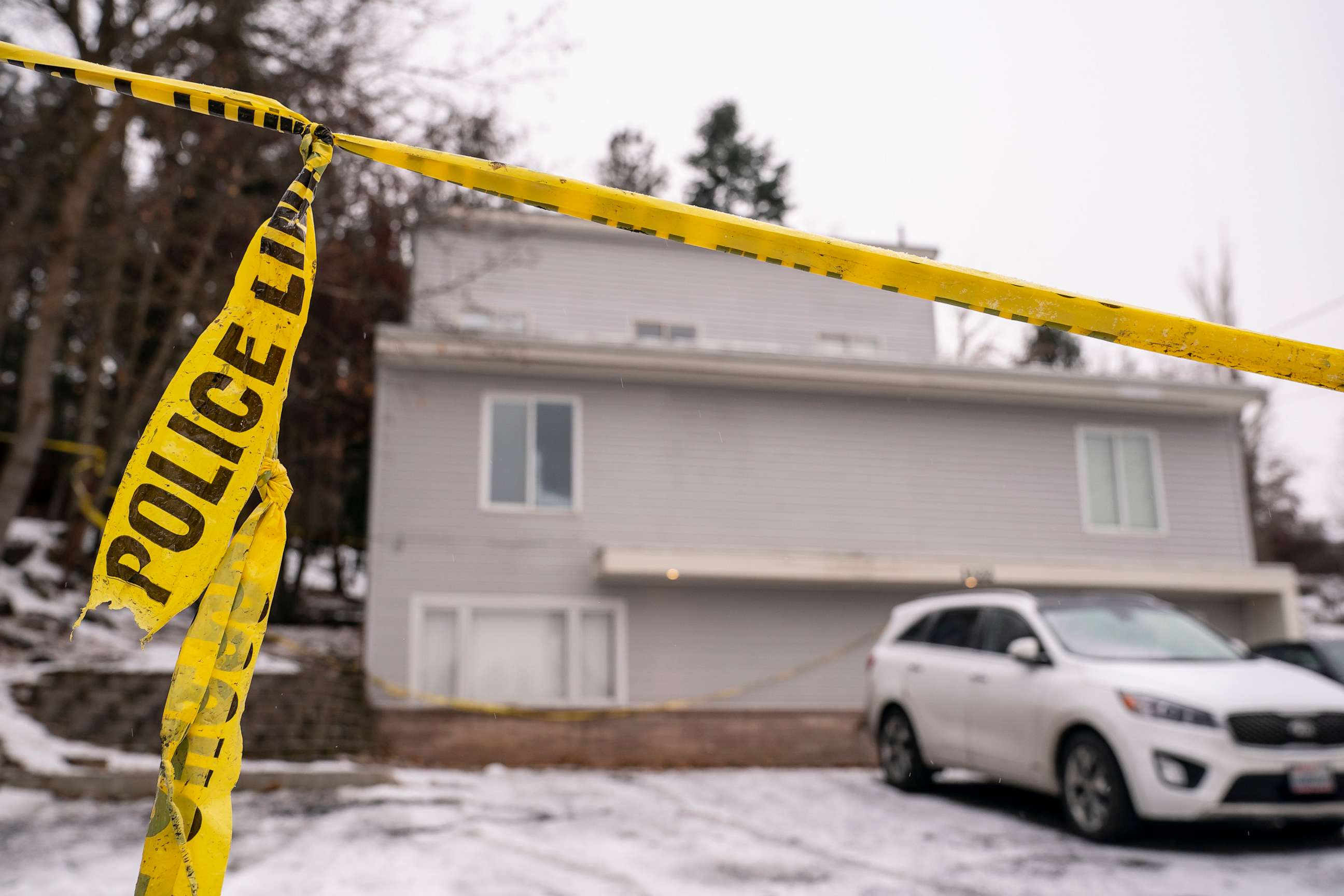
MORE: Lawyer for Idaho college killings suspect Bryan Kohberger says he was driving alone night of murders
The roommate said "she looked out of her bedroom but did not see anything when she heard the comment about someone being in the house," the documents said. "She opened her door a second time when she heard what she thought was crying coming from Kernodle's room."
The roommate "then said she heard a male voice say something to the effect of 'it's ok, I'm going to help you,'" according to the documents.
The roommate said she opened her door again after she heard the crying -- and then saw a "figure clad in black clothing and a mask that covered the person's mouth and nose walking towards her," who she described as "5'10" or taller, male, not very muscular, but athletically built with bushy eyebrows," and who "walked past" her "towards the back sliding glass door" as the roommate stood in "frozen shock," according to a police affidavit.
Who were the victims?
Kaylee Goncalves, 21, and Madison Mogen, 21, were lifelong best friends and inseparable. Goncalves was set to graduate in December 2022 and move to Texas.
Goncalves' sister, Alivea Goncalves, considered Mogen a sister, too. She said she was comforted by the fact that the best friends were in the same bed together in their final moments.
"If I couldn't have been there to hold their hands and to take that pain from them, at least they had each other," she told ABC News.

The two other victims were 20-year-old Xana Kernodle, and her boyfriend, 20-year-old Ethan Chapin.
Chapin was a triplet. His brother and sister also attend the University of Idaho.
Chapin and Kernodle were the "perfect pair" who had an "unstoppable, loving relationship," a surviving roommate said in a statement in December.
"They both would look at each other with so much love," she said.

Pieces of evidence
After the victims were discovered, authorities reviewed surveillance video from the area and saw the suspect's white Hyundai Elantra go by the victims' house three times, before entering the area for a fourth time at 4:04 a.m, according to the affidavit.
Police said they traced the car's travel that night back to nearby Pullman, Washington, where the suspect lived while attending Washington State.
Kohberger's phone was tracked heading to Moscow before the attack and as the driver of the white Elantra returned to Pullman. However, the phone was off from 2:47 a.m. to 4:48 a.m., which "is consistent with Kohberger attempting to conceal his location during the quadruple homicide," the document said.
MORE: Idaho authorities probe Amazon 'click activity' for knives possibly connected to college killings
His phone was near the victims' house at least 12 times before the murders, at least as far back as August, the document said.
DNA from the suspect was also recovered on a knife sheath left on Mogen's bed, according to the documents.
Where does the case stand?
Kohberger is charged with four counts of first-degree murder and one count of burglary. He could face the death penalty if convicted.
The former Ph.D. student declined to offer a plea at his arraignment in May, so the judge entered a not guilty plea on his behalf.
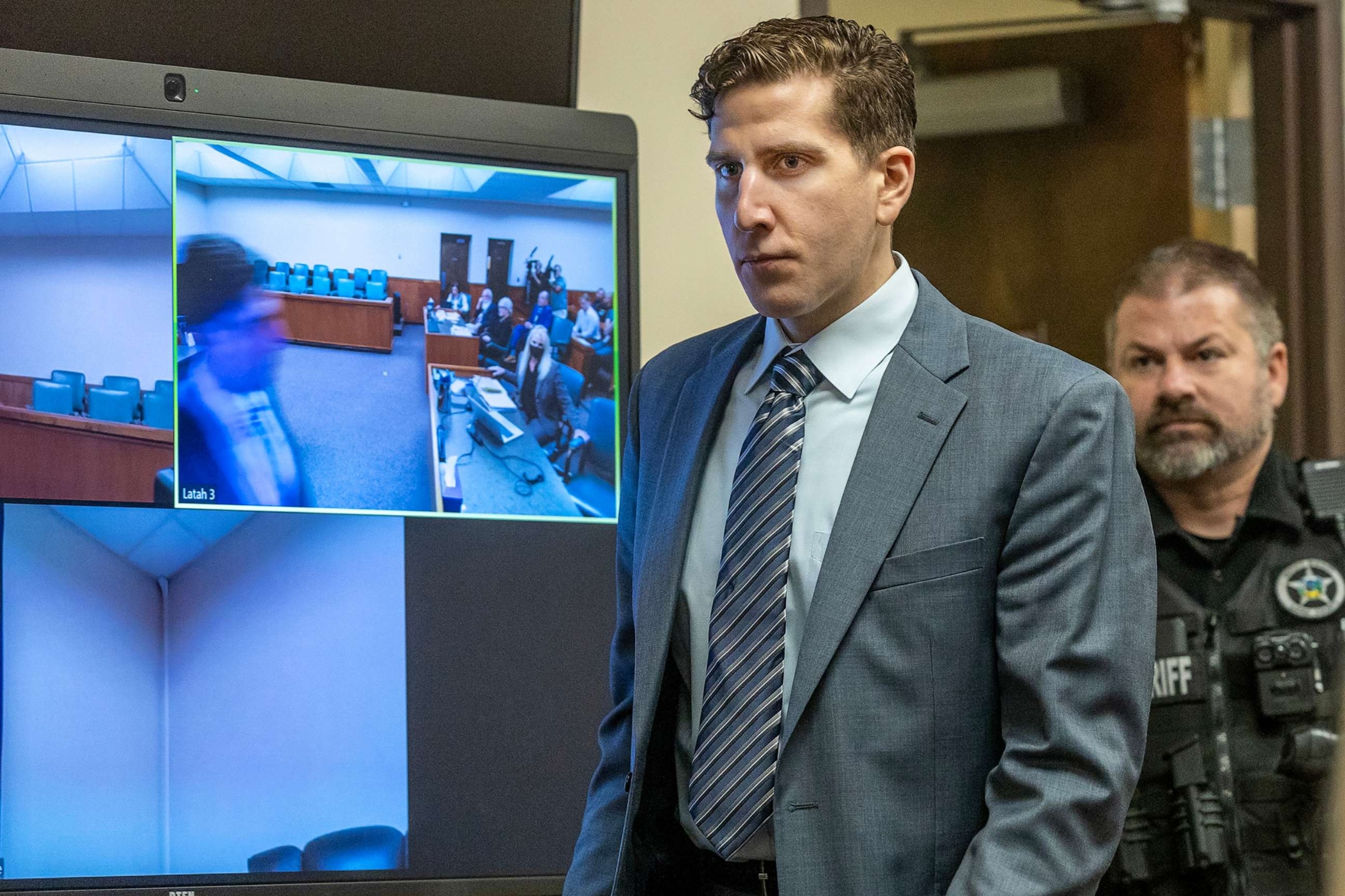
MORE: Trial for Idaho college killings suspect Bryan Kohberger delayed indefinitely
Kohberger's lawyers have said their client wasn't in the home where the homicides occurred and was driving around alone that night.
In August, Kohberger waived his right to a speedy trial, indefinitely delaying what was supposed to be an Oct. 2 start date.
A new trial date has not been set.
What possible hurdles are ahead during trial?
The DNA discovered on the button snap of the knife sheath that was found near Mogen's body is a critical linchpin for the prosecution in what is a largely circumstantial case.
That DNA, authorities argued, undeniably links Kohberger to the crime scene, saying that DNA "showed a statistical match" with a cheek swab taken directly from Kohberger after his arrest.

Kohberger's attorneys have attempted to cast doubt on the strength of investigators' evidence and whether it pointed irrefutably to just their client, including the DNA. The defense has repeatedly asked for more information on the genealogical analyses used to zero in on Kohberger, and have pushed back on investigators' analysis that the DNA is a statistical match.
Kohberger's attorneys also highlight what they called a "total lack of DNA evidence" from the victims in Kohberger's home or car.
"There are so many layers that make this an extraordinary case -- and the defense is going to attack any aspect of it that they see as vulnerable," David Calviello, a former New Jersey prosecutor who is now a criminal defense attorney, told ABC News in August. "It makes sense for them to take shots at how certain evidence was presented to the grand jury -- whether there were missed steps, cut corners, chain of custody problems, contamination -- or not. "
The knife used in the murders has not been recovered.
A series of now-unsealed search warrant documents show investigators have sought records of Amazon purchases and click history data for an Amazon customer including "all detailed customer click activity pertaining to knives and accessories," as well as a long list of information that could flesh out the customer's full shopping movements and interests on the site, like items that were wish-listed or saved for later. If prosecutors can link Kohberger to the purchase of a knife that could have been used in the killings, experts say that could help bolster their case.
What will happen to the house?
The University of Idaho announced in February that the house where the four students were killed would be torn down, with university President Scott Green calling it "a healing step."
In June, a university spokesperson said the school planned to demolish the house before students returned to campus in the fall.
In July, the university announced a sudden halt to the demolition plans as they removed asbestos and lead from the home -- and amid objections from some of the victims' families who expressed concern that demolishing the house before Kohberger's trial could cause unanticipated problems for prosecutors as they try to secure a guilty verdict.

About two weeks after Kohberger waived his speedy right to a trial in August, university officials decided they would hold off on tearing down the home until at least the end of the fall semester, which ends in mid-December.
With no new trial date set, prosecutors asked the University of Idaho for access to the house.
The university said FBI agents would be at the house on Oct. 31 and Nov. 1 "to get documentation to construct visual and audio exhibits and a physical model of the home."
"While the university still intends to demolish the home, it will not be done this semester," the university said on Oct. 31.
The families
Ethan Chapin, who was a triplet, had been planning his 21st birthday with his siblings "forever," his parents said. Last month, his brother, Hunter, and sister, Maizie, turned 21 without him.

As the Chapins face one year without Ethan, they said they plan on acknowledging Nov. 13 with a private fundraiser for their foundation, Ethan's Smile Foundation, to help provide scholarships to post-high school students so that they can follow their dreams. The Chapins said they can't think of a better way to honor their son than to support education.
"Ethan stood for love, kindness, laughter and loyalty," his mother, Stacy Chapin, told ABC News. "He was the very best."
Kaylee Goncalves' dad, Steve Goncalves, said Kaylee's younger siblings are now grappling with their own birthdays. He said "they don't want to be older than their sister."

To Steve Goncalves, Nov. 13 is not an anniversary.
"This is more like a memorial -- some type of an event that you have to look at and think about, but it's not something that you ever look forward to," he told ABC News.
"My daughter has allowed me to meet people across the world through her life and memory and her beauty. And I'll thank her one day when I see her," Steve Goncalves said. "I'll tell her how much she impacted the world and how proud of her I am."
FOLLOW THE PODCAST: " The King Road Killings: An Idaho Murder Mystery " from ABC News, available on Apple Podcasts , Spotify , Amazon Music , or your preferred podcast player.
ABC News' Kayna Whitworth, Nick Cirone and Timmy Truong contributed to this report.
Related Topics
- Idaho College Murders
Top Stories

Total solar eclipse 2024: Path, time and the best places to view
- 3 hours ago

150 arrested for allegedly using drones to transport drugs, cellphones into prisons
- Mar 29, 3:43 PM

President Joe Biden is lapping Donald Trump when it comes to campaign cash — and he'll need it
- Mar 30, 12:05 AM

Melissa Joan Hart reacts to 'Quiet on Set' docuseries
- Mar 29, 1:03 PM

A man suspected of holding 4 hostages for hours in a Dutch nightclub has been arrested
- Mar 30, 5:52 AM
ABC News Live
24/7 coverage of breaking news and live events
2024 Excellence in Undergraduate Teaching Award Recipients

Congratulations to CLA's Excellence in Undergraduate Teaching Award recipients:
- Fahima Aziz (Economics)
- Katrien Vanpee (Asian & Middle Eastern Studies)
Each year the College of Liberal Art recognizes select instructors who are outstanding teachers of undergraduate students, rewarding their passion and commitment to teaching. The Excellence in Undergraduate Teaching Award acknowledges non-tenure-track instructors who:
- Inspire their students and genuinely care about their progress.
- Are approachable and accessible to their students.
- Show an interest in individual students’ well-being and in programs for the benefit of students generally.
- Give of themselves generously in advising, counseling, and directing projects.
- Create an active classroom atmosphere.
- Provide a model for undergraduate students through their own research and teaching, and leave an impression by their efforts which alumni recall with appreciation and esteem.
- Demonstrates distinguished teaching through scholarly mastery of material as evidenced by productivity and pedagogical sophistication.
- Made significant contributions, such as developing new courses, organizing or reorganizing curricular programs, or improving teaching methods and techniques.
CLA faculty and staff have been awarded many prestigious awards. Visit our Faculty of Distinction page to learn more.
Related News
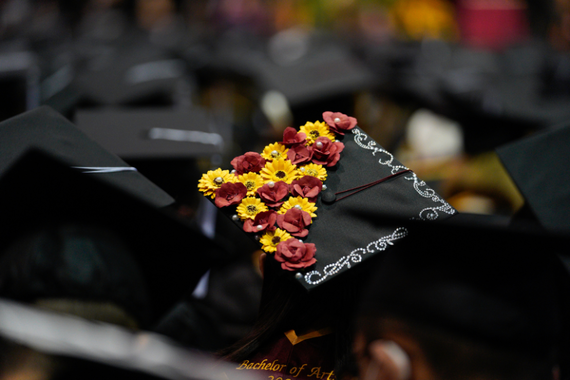
2024 Career Readiness Award Recipients
Thank you to Katherine Scheil (English) and Terri Sutton (English) for their outstanding contributions to Career Readiness.
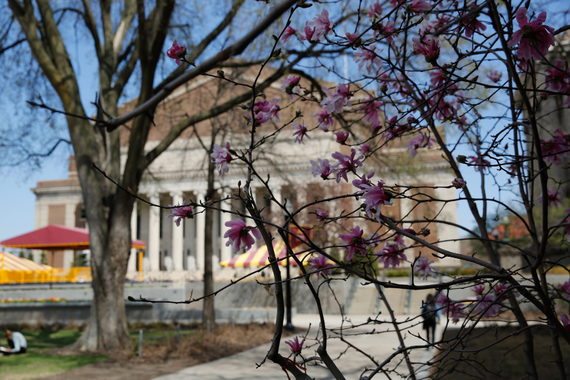
News about the publications, creative activities, and recognition given to our faculty, staff, and graduate students — updated monthly.
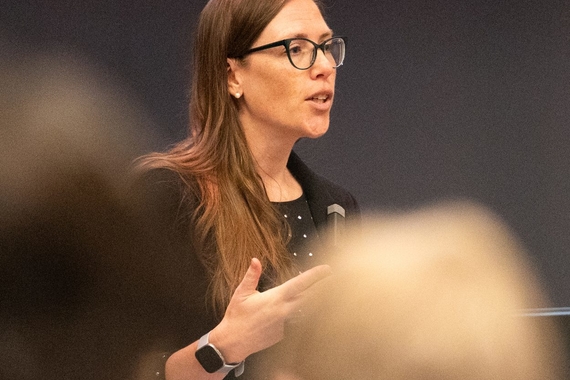
Minnesota high school students bring history to life through the U of M’s College in the Schools program
“History isn’t just about facts—at the college level, it’s about understanding how [historical narratives] are made,” says Katharine Gerbner, associate professor of history
More CLA News
March 30, 2024
Winnipeg 0° C , Cloudy
Full Forecast
- Advertising Contact
- Send a Letter to the Editor
- Staff biographies
- Submit a News Tip
- Subscribe to Newsletters
- Notifications
- Create Account
- Compact View
- About the E-Edition
- Winnipeg Free Press
- Community Review East
- Community Review West
- All Arts & Life
- Celebrities
- Environment
- Food & Drink
- Life & Style
- Science & Technology
- All Business
- Agriculture
- Personal Finance
- Manitoba’s Top Employers
- All Opinion
- Editorial Cartoon
- Letters to the Editor
- Auto Racing
- Blue Bombers
- High School
- Horse Racing
- Winnipeg Jets
- Manitoba Moose
- Reader Bridge
- Free Press 101: How we practise journalism
- Advertising
- Carrier Positions & Retailer Requests
- FP Newspapers Inc.
- Internships
- Job Opportunities
- Local Journalism Initiative
- Privacy Policy
- Retail Locations
- Staff Biographies
- Terms and Conditions
- All Free Press Community Review News
- East Edition
- West Edition
- Classifieds
- All FP Features
- Business Hub
- Drink & Dine
- Health & Wellness
- Whiskers & Wings
- Sponsored Articles
- Property Listings
- Featured News
- Renovation and design
- Resale homes
- Newsletters
- Niigaan and the Lone Ranger
- Photo and Book store
- Become a Patron
© 2024 Winnipeg Free Press
Quick Links
- Publications
- Sponsored Content
Ways to support us
- Pay it Forward program
- Support Faith coverage
- Support Arts coverage
Replica E-Edition
Arts & Life
- Photo Galleries
Canstar Community news
Notification Settings
This browser doesn't support push notifications at the moment. Check browsers features, update your browser or try to use one from the list of recommended to manage your notifications settings:
- Firefox (27+)
- Google Chrome (30+)
- Safari ( MacOS 13+ with browser 16.1+ and iOS 16.4+ ) / Note make sure Push API support enabled under Settings > Safari > Advanced > Experimental Features
- Microsoft Edge
If you wish to manage your notification settings from this browser you will need to update your browser's settings for this site. Just click button below and allow notifications for this site
Note Safari 16.4+ working on iOS devices also need this site app to be installed at device's Home Screen for Push Notifications to work
Notifications are blocked for this site. If you wish to manage your notification settings from this browser you will need to update your browser's settings. Usually you'd need to click on site options icon to the left of address bar and change notifications preferences/permissions from there
Breaking News
Urgent and important stories
Recommended Reads
Noteworthy news and features
Should college essays touch on race? Some feel the affirmative action ruling leaves them no choice
Advertisement
Advertise with us
CHICAGO (AP) — When she started writing her college essay, Hillary Amofa told the story she thought admissions offices wanted to hear. About being the daughter of immigrants from Ghana and growing up in a small apartment in Chicago. About hardship and struggle.
Read this article for free:
Already have an account? Log in here »
To continue reading, please subscribe:
Monthly Digital Subscription
$19 $0 for the first 4 weeks *
- Enjoy unlimited reading on winnipegfreepress.com
- Read the E-Edition, our digital replica newspaper
- Access News Break, our award-winning app
- Play interactive puzzles
*No charge for 4 weeks then billed as $19 every four weeks (new subscribers and qualified returning subscribers only). Cancel anytime.
Read unlimited articles for free today:
Then she deleted it all.
“I would just find myself kind of trauma-dumping,” said the 18-year-old senior at Lincoln Park High School in Chicago. “And I’m just like, this doesn’t really say anything about me as a person.”

When the Supreme Court ended affirmative action in higher education, it left the college essay as one of few places where race can play a role in admissions decisions. For many students of color, instantly more was riding on the already high-stakes writing assignment. Some say they felt pressure to exploit their hardships as they competed for a spot on campus.
Amofa was just starting to think about her essay when the court issued its decision, and it left her with a wave of questions. Could she still write about her race? Could she be penalized for it? She wanted to tell colleges about her heritage but she didn’t want to be defined by it.
In English class, Amofa and her classmates read sample essays that all seemed to focus on some trauma or hardship. It left her with the impression she had to write about her life’s hardest moments to show how far she’d come. But she and some classmates wondered if their lives had been hard enough to catch the attention of admissions offices.
This year’s senior class is the first in decades to navigate college admissions without affirmative action. The Supreme Court upheld the practice in decisions going back to the 1970s, but this court’s conservative supermajority found it is unconstitutional for colleges to give students extra weight because of their race alone.
Still, the decision left room for race to play an indirect role: Chief Justice John Roberts wrote universities can still consider how an applicant’s life was shaped by their race, “so long as that discussion is concretely tied to a quality of character or unique ability.”
Scores of colleges responded with new essay prompts asking about students’ backgrounds.
When Darrian Merritt started writing his essay, his first instinct was to write about events that led to him going to live with his grandmother as a child. Those were painful memories, but he thought they might play well at schools like Yale, Stanford and Vanderbilt.
“I feel like the admissions committee might expect a sob story or a tragic story,” said Merritt, a senior in Cleveland. “I wrestled with that a lot.”
Eventually he abandoned the idea and aimed for an essay that would stand out for its positivity.
Merritt wrote about a summer camp where he started to feel more comfortable in his own skin. He described embracing his personality and defying his tendency to please others. But the essay also reflects on his feelings of not being “Black enough” and getting made fun of for listening to “white people music.”
Like many students, Max Decker of Portland, Oregon, had drafted a college essay on one topic, only to change direction after the Supreme Court ruling in June.
Decker initially wrote about his love for video games. In a childhood surrounded by constant change, navigating his parents’ divorce, the games he took from place to place on his Nintendo DS were a source of comfort.
But the essay he submitted to colleges focused on the community he found through Word is Bond, a leadership group for young Black men in Portland.
As the only biracial, Jewish kid with divorced parents in a predominantly white, Christian community, Decker wrote he felt like the odd one out. On a trip with Word is Bond to Capitol Hill, he and friends who looked just like him shook hands with lawmakers. The experience, he wrote, changed how he saw himself.
“It’s because I’m different that I provide something precious to the world, not the other way around,” wrote Decker, whose top college choice is Tulane, in New Orleans, because of the region’s diversity.
Amofa used to think affirmative action was only a factor at schools like Harvard and Yale. After the court’s ruling, she was surprised to find that race was taken into account even at public universities she was applying to.
Now, without affirmative action, she wondered if mostly white schools will become even whiter.
It’s been on her mind as she chooses between Indiana University and the University of Dayton, both of which have relatively few Black students. When she was one of the only Black students in her grade school, she could fall back on her family and Ghanaian friends at church. At college, she worries about loneliness.
“That’s what I’m nervous about,” she said. “Going and just feeling so isolated, even though I’m constantly around people.”
The first drafts of her essay didn’t tell colleges about who she is now, she said.
Her final essay describes how she came to embrace her natural hair. She wrote about going to a mostly white grade school where classmates made jokes about her afro.
Over time, she ignored their insults and found beauty in the styles worn by women in her life. She now runs a business doing braids and other hairstyles in her neighborhood.
Business Weekly
Monday mornings
The latest local business news and a lookahead to the coming week.
“Criticism will persist,” she wrote “but it loses its power when you know there’s a crown on your head!”
Ma reported from Portland, Oregon.
The Associated Press’ education coverage receives financial support from multiple private foundations. AP is solely responsible for all content. Find AP’s standards for working with philanthropies, a list of supporters and funded coverage areas at AP.org.
Advertisement Advertise With Us
Advertise With Us
Featured Local Savings

IMAGES
VIDEO
COMMENTS
We will write a custom essay on your topic. High school is usually awkward for most people as the first year of high school is usually filled with anxiety and kind of defines the role of the individual for the remaining years in the high school. The college first-year, however, is very jovial and fun, with immense choices and a variant future ...
Conclusion. High school and college are crucial stages in the educational journey, aiming to impart knowledge and skills for future careers. While there are similarities in class structure, examinations, homework, and the division of disciplines into courses, there are also differences in social life, freedom, personal application, learning methods, and accountability.
The high school life experience is not just about studying. It's about learning life skills, making friends, and growing as a person. It's a time of change and growth, and it's a time that will shape who you become in the future. So, cherish every moment of your high school life because it is a once in a lifetime experience.
High school and college have distinct differences and similarities that shape students' academic and social experiences. From the structure of the education system to the level of independence and responsibilities, navigating the transition from high school to college can be challenging.This article will explore the key contrasts and comparisons between high school and college life based on ...
High School: You attend all the scheduled classes. You have a lot of classes a day. You are obligated to be in school and do your homework. College: You schedule your classes the way you want. You choose classes which you long to learn. Attending classes and completing assignments are your responsibility.
High school and college are two distinct stages of education that students go through in their academic journey. While both are essential in shaping an individual's future, they differ significantly in terms of the environment, academic workload, and overall experience.
The biggest change for high school vs. college is that, in college, you'll have much more independence than you had in high school. Many people focus on the fact that you'll be living away from your parents, and this is a part of it, but you'll have independence in many other areas as well. You'll have the freedom to decide what you want to ...
4. Classes may be longer but are usually less frequent. In high school, your classes were probably around an hour, but you had them 4-5 times per week. In college, be prepared for long, less frequent classes. It's not uncommon to see courses that meet once a week for three hours.
A.1 College life is completely different from school life. It gives us more exposure and also makes us more confident. Our teachers act more like friends in college, whereas in school they're like our mentors. Most importantly, college life gives us various challenges than our school life.
Welcome to college! High School vs College: Academics. From homework to class time to exams to teacher-student relationships, high school vs college life has its differences. 1. Time Spent in Class and Attendance. Your professor likely won't be taking attendance, and even if they are, it's up to you if you want those participation points or ...
Technique #1: humor. Notice Renner's gentle and relaxed humor that lightly mocks their younger self's grand ambitions (this is different from the more sarcastic kind of humor used by Stephen in the first essay—you could never mistake one writer for the other). My first dream job was to be a pickle truck driver.
In conclusion, high school and college have similarities but mostly have differences. They contrast with the curriculum or subject offered and the level of difficulty of lessons and assessments. In addition, they differ in terms of workload and the students' ability to manage their time. Their differences exist for a purpose, but their goal ...
College: In college, professors refer to the textbooks they wrote. High School: In high school, you studied comfortably at home before a test. College: In college, the library becomes your home away from home. High School: In high school, you wrote notes to friends. College: In college, you take notes for yourself.
Importance of Physical Education Courses at University Level. College Life ; Physical Education ; The brief history of physical education would start in just about 1820 when schools focused on gymnastics, hygiene training and care, and development of the human body.
Thousands of new faces, eclectic traditions, sleek architecture, wild turkeys, and a sense of freedom — it was unlike anything I experienced in high school. And college is different from high school — filled with different experiences, resources, and opportunities that will shape who you are. Every student has been where you are now, myself ...
College life is not only about the study but also about the overall development of an individual through various activities and challenges. In College Life, one gets a chance to make their own decisions. In school life, students get an opportunity to be class monitors. In College Life, an individual gets a chance to nominate himself/herself for ...
Beyond the educational similarities, high school and college share commonalities in the social aspects of student life. Both serve as opportunities for students to meet new friends from diverse backgrounds and cultures. The interactions in these settings can lead to lifelong friendships and a broader perspective on the world.
Pages: 2 (722 words) Views: 213. Grade: 5. Download. High school and college are two distinct phases in a student's academic journey. While both serve as crucial stepping stones towards higher education and future careers, they differ significantly in terms of structure, curriculum, social life, and overall experience.
High school is free unless you're going to a private school but even then a typical private school won't cost as much as college. As reported by OSU, "seven out of ten college students feel stressed about their finances and nearly 60 percent said they worry about having enough money to pay for school, while half are concerned about paying ...
Similarly, high school and college are a type of education. Anyone has the eligibility to attend one or the other; although high school is mandatory. Both schools are required to prepare students academically and challenge them. These challenges sought after in high school and college are basically preparations for future success. Both high ...
Is High School a Good Time to Train for a Career? 102. Is There Such a Thing as a 'Useless' College Major? 103. Should All High School Students Have Part-Time Jobs? 104.
Only 47 percent of public high schools say they're doing a "very good" or "excellent" job preparing students for college, according to a new survey from the National Center for Education Statistics, a branch of the U.S. Education Department.. The data, gathered from over 1,600 public schools across all 50 states, also showed that schools in low-income neighborhoods were much less ...
Early college/dual enrollment programs can be transformative for high school students. Credit: Newsday/John Paraskevas By Robert Rotunda and Kelly Whitney-Rivera Guest essay March 22, 2024 6:00 pm
Hillary Amofa listens to other members of the Lincoln Park High School step team after school in Chicago. When she started writing her college essay, Amofa told the story she thought admissions ...
Education-Affirmative Action Hillary Amofa listens to others member of the Lincoln Park High School step team after school Friday, March 8, 2024, in Chicago. When she started writing her college ...
This climate affects the daily life of the city's citizens as well as the local wildlife and environment. Moscow's cultural landscape includes a mix of traditional and modern influences, from beautiful orthodox churches to iconic Soviet-era architecture.
Four students were killed in an off-campus house on Nov. 13, 2022. Monday marks one year since four University of Idaho students were stabbed to death in a gruesome home invasion that garnered ...
Each year the College of Liberal Art recognizes select instructors who are outstanding teachers of undergraduate students, rewarding their passion and commitment to teaching. The Excellence in Undergraduate Teaching Award acknowledges non-tenure-track instructors who: Inspire their students and genuinely care about their progress.
Breaking News, Sports, Manitoba, Canada. CHICAGO (AP) — When she started writing her college essay, Hillary Amofa told the story she thought admissions offices wanted to hear.
Karla Torres, a recent high school graduate, designed and created this 18th-century-inspired prom dress out of duct tape for a "Stuck at Prom" scholarship contest. Gary Coronado, Los Angeles Times